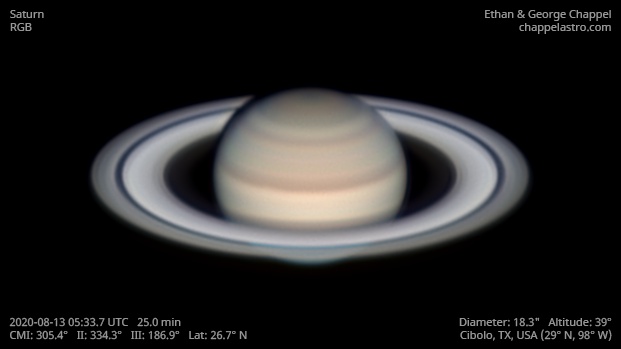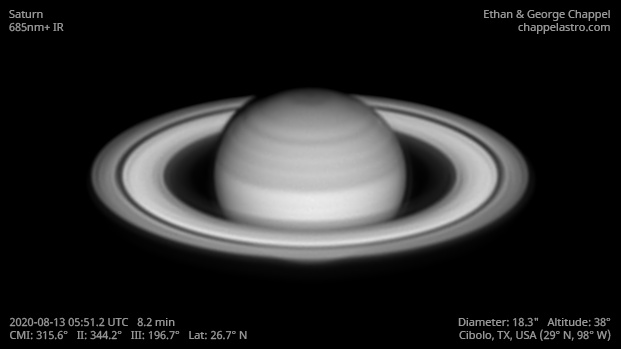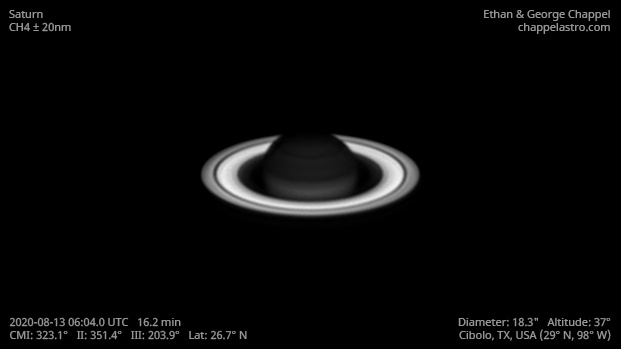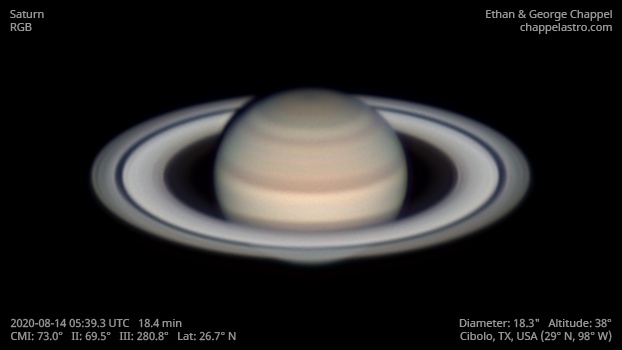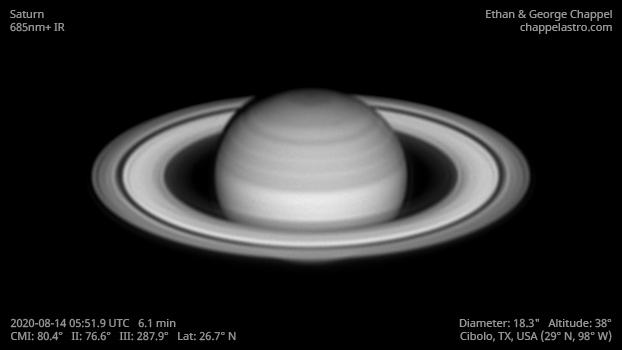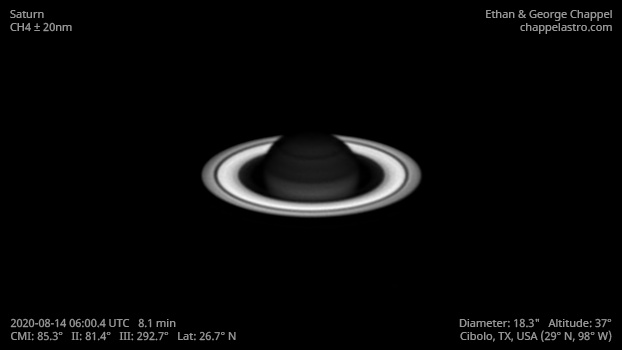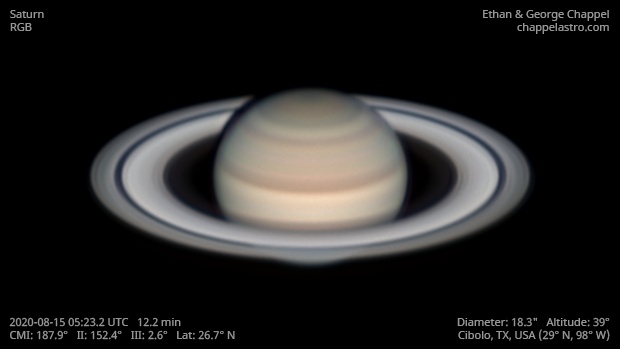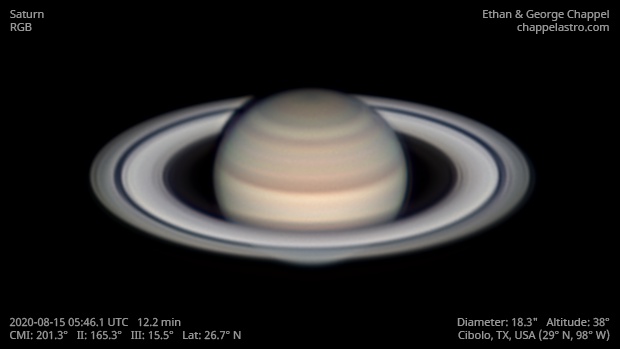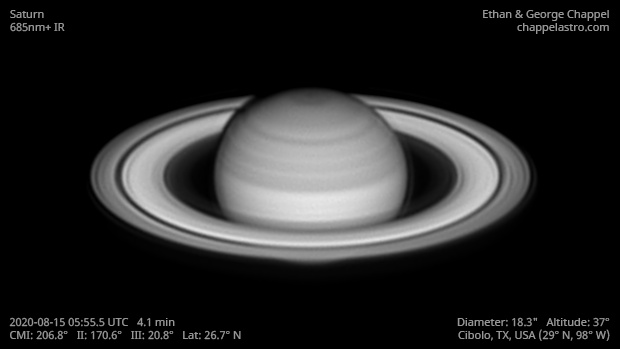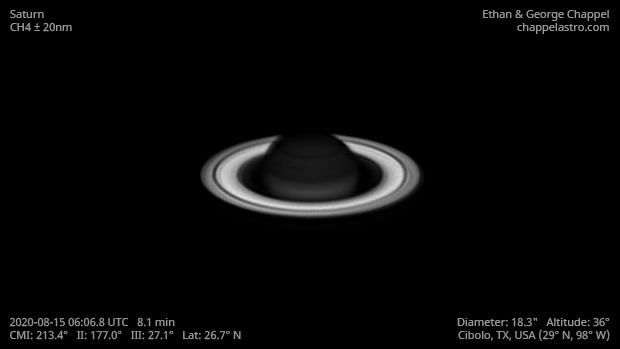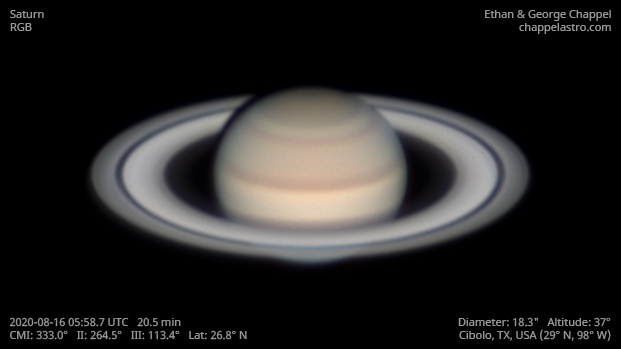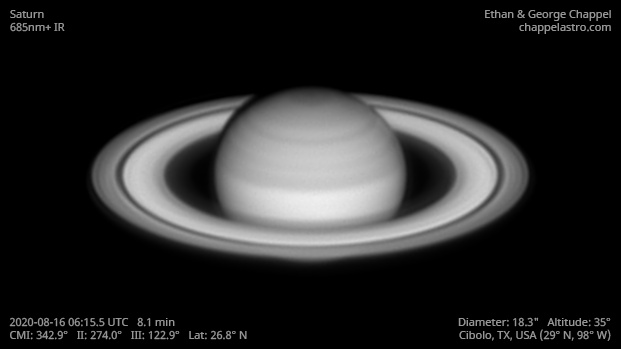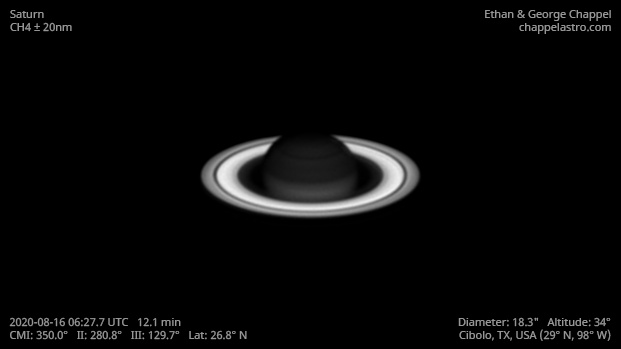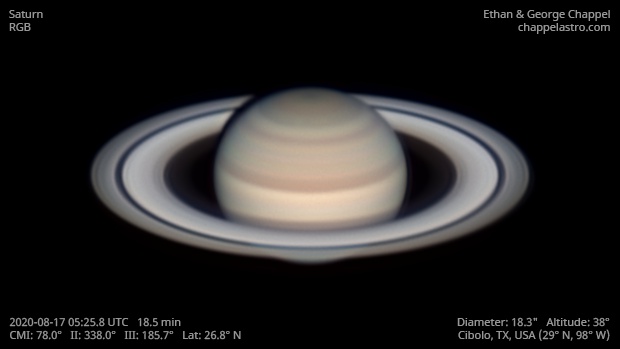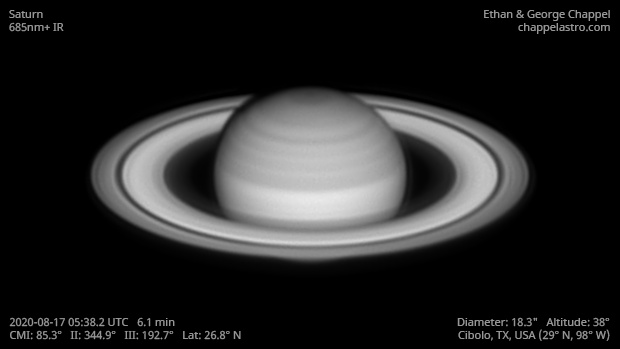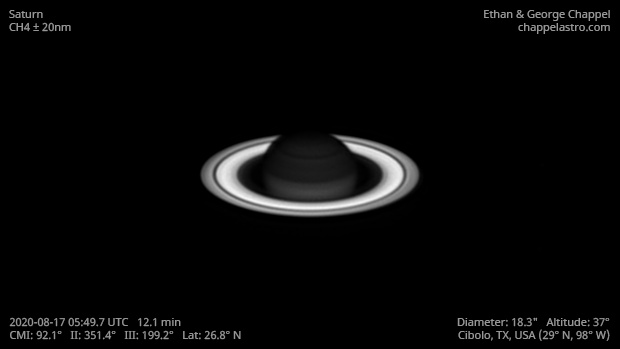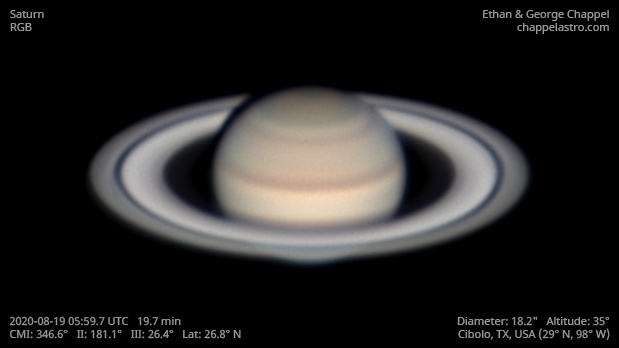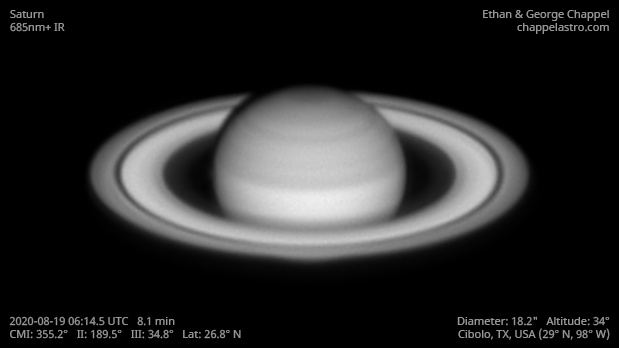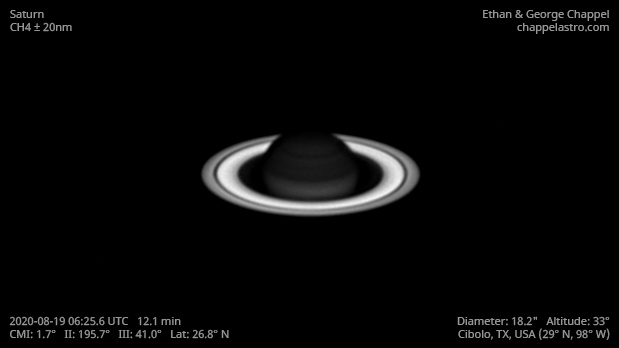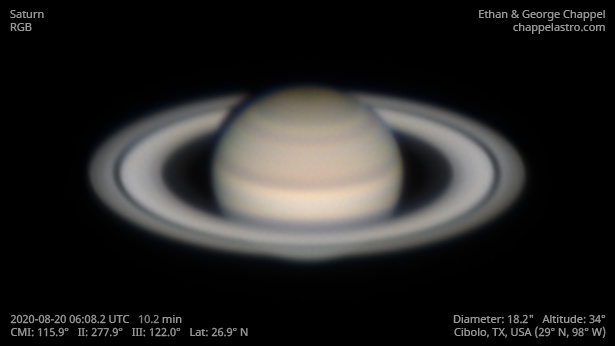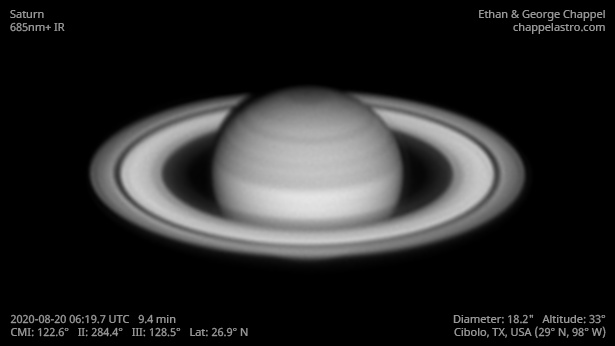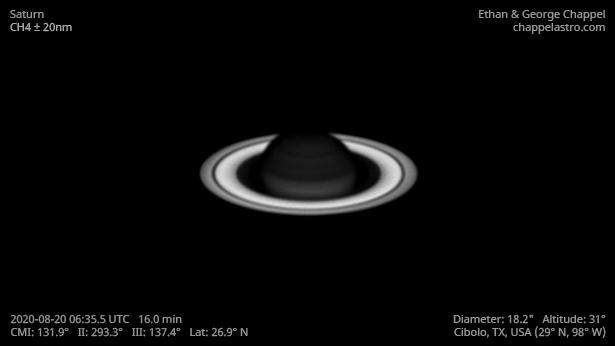Saturn 2020
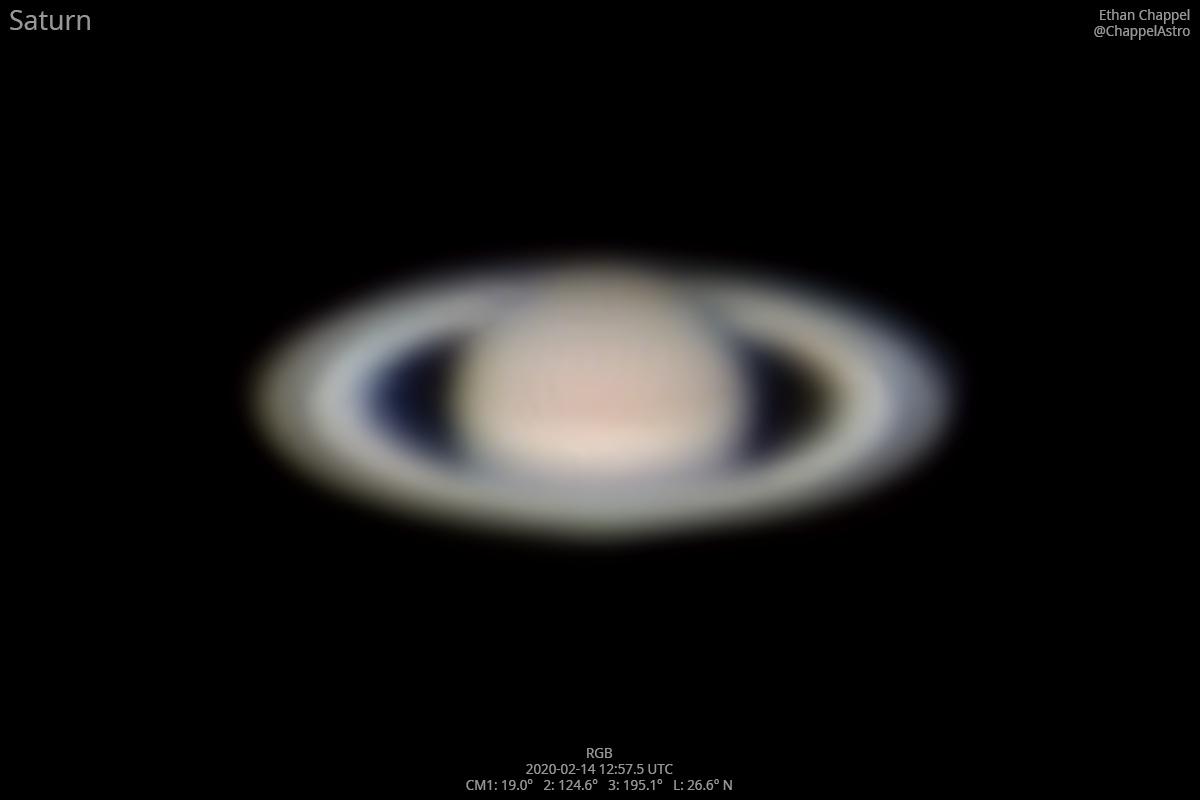
UTC
Saturn was almost invisible to the naked eye by the time I finished with Jupiter. It took a few attempts to find it in the telescope. The Sun had almost risen by the time I finished the near-infrared image.
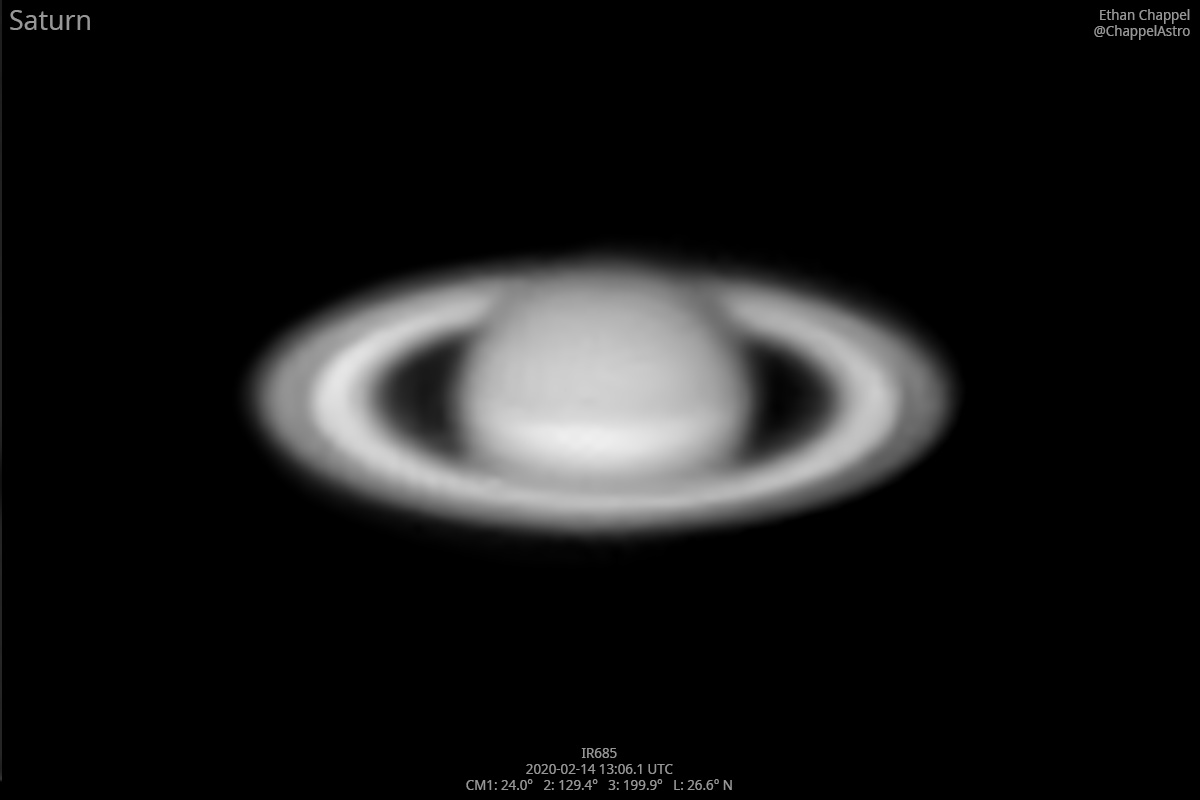
UTC
Saturn was almost invisible to the naked eye by the time I finished with Jupiter. It took a few attempts to find it in the telescope. The Sun had almost risen by the time I finished the near-infrared image.
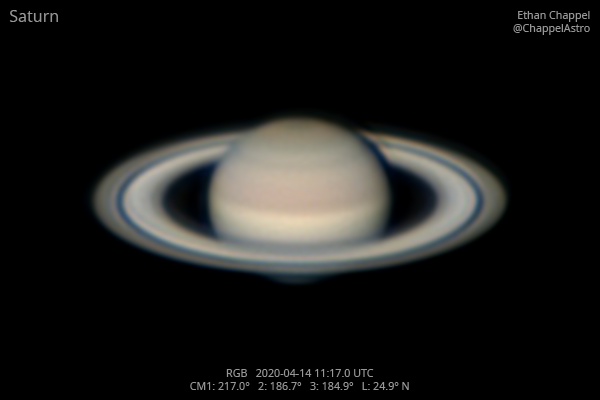
UTC
First Saturn image of the apparition where I'm not shooting low through the bright dawn sky. Tested a shorter exposure with higher gain to cut through the seeing. Image turned out better than expected, so I think it worked well.
Notes:
- The northern regions are slightly redder compared to last apparition.
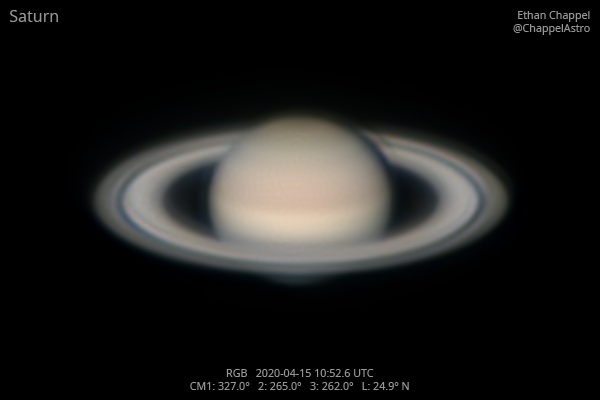
UTC
Conditions were quite tough for imaging. I usually start with the planet farthest in their east-to-west track in the sky. Jupiter is currently farthest along, but I wanted to wait for the Great Red Spot to rotate into view, so I started with Saturn instead.
Notes:
- The southernmost regions peeking out from under the rings are visibly bluer than the rest of the planet.
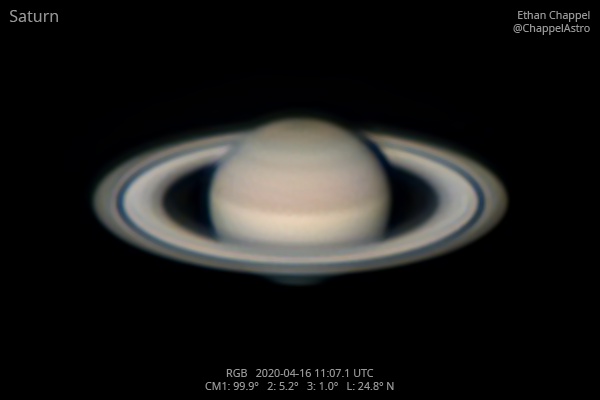
UTC
Although the seeing conditions hid small details, it was much better than the previous morning.
Notes:
- The northern regions are redder compared to last apparition.
- The southernmost regions peeking out from under the rings are visibly bluer than the rest of the planet.
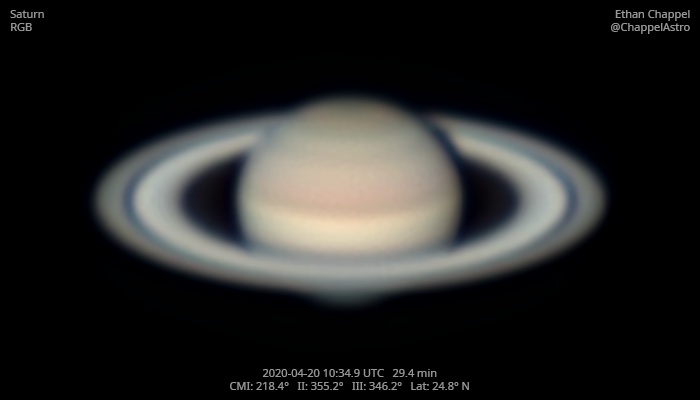
UTC
Ground conditions were more favorable for setting up the C14 setup than the last few imaging sessions. Unfortunately, the sky conditions were worse than the forecast anticipated. I saw two satellites glint while imaging Saturn: Iridium 911 between Jupiter & Saturn, and Globalstar M058 near Antares.
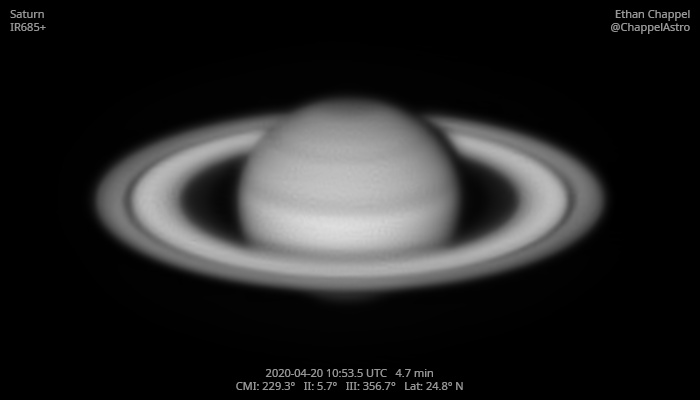
UTC
Ground conditions were more favorable for setting up the C14 setup than the last few imaging sessions. Unfortunately, the sky conditions were worse than the forecast anticipated. I saw two satellites glint while imaging Saturn: Iridium 911 between Jupiter & Saturn, and Globalstar M058 near Antares.
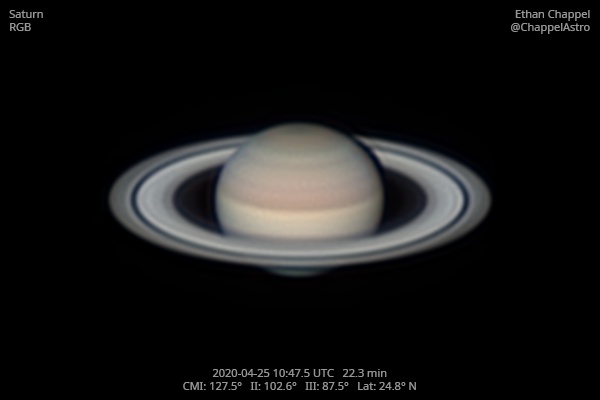
UTC
Seeing and transparency were pretty good this morning. Unfortunately, I missed out on using the C14 because I anticipated strong wind.
Notes:
- The area surrounding the hexagon is reddish.
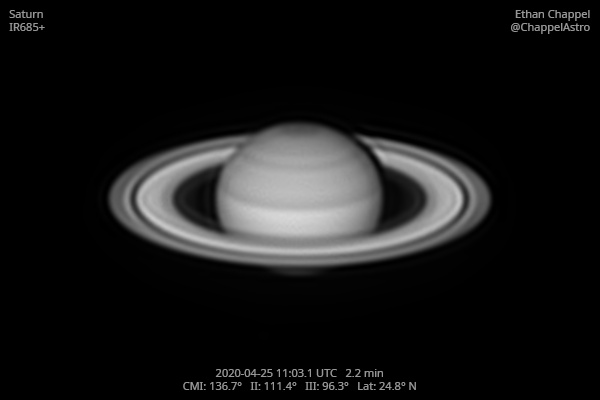
UTC
Seeing and transparency were pretty good this morning. Unfortunately, I missed out on using the C14 because I anticipated strong wind.
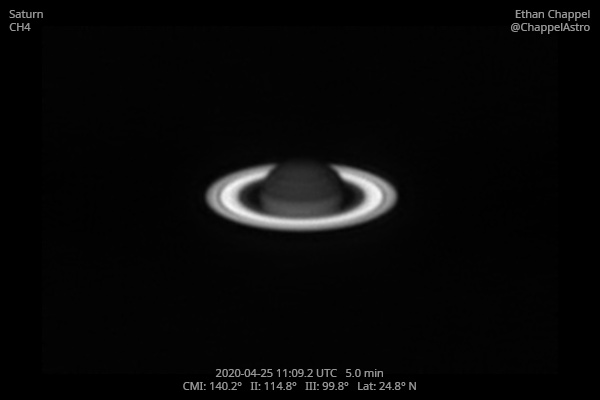
UTC
Seeing and transparency were pretty good this morning. Unfortunately, I missed out on using the C14 because I anticipated strong wind.
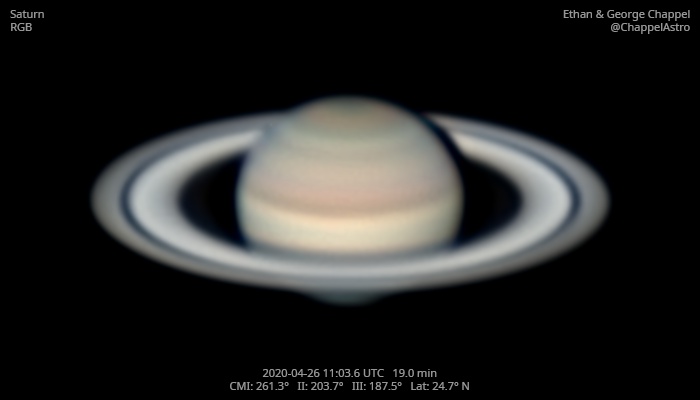
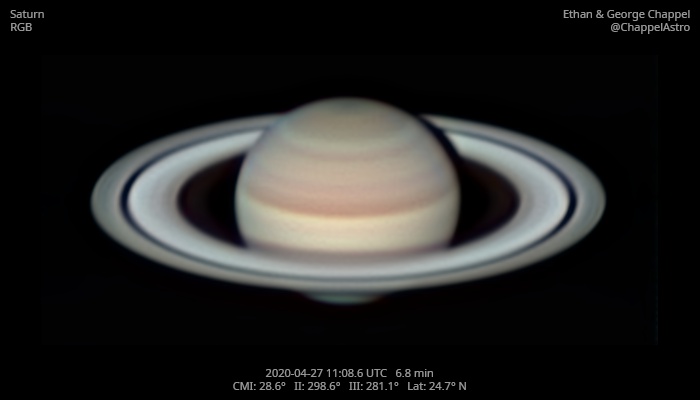
UTC
This morning saw improvements in imaging conditions compared to previous mornings.
Notes:
- The North North Temperate Zone is bright.
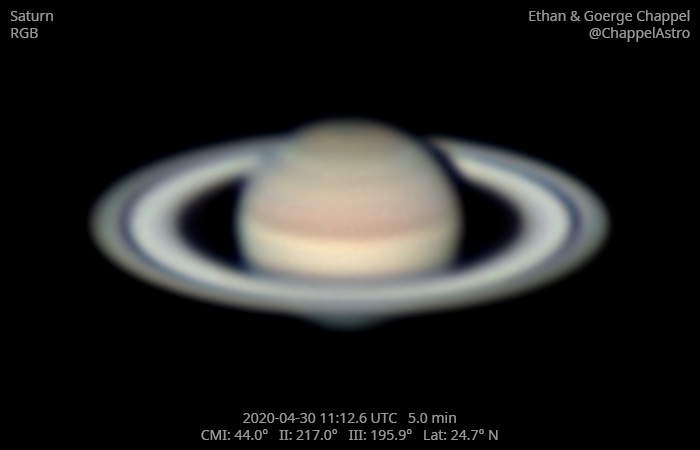
UTC
Another morning of bad seeing to finish a difficult month of imaging. I decided to extend my time on Saturn instead of moving on to Mars because of the seeing.
Notes:
- The North North Temperate Zone is bright.
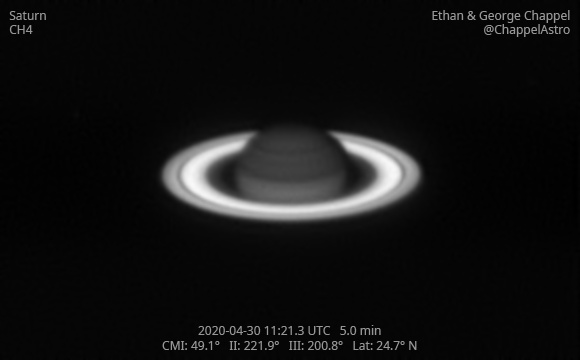
UTC
Another morning of bad seeing to finish a difficult month of imaging. I decided to extend my time on Saturn instead of moving on to Mars because of the seeing.
Notes:
- The Equatorial Zone appears to have a bright band on the equator.
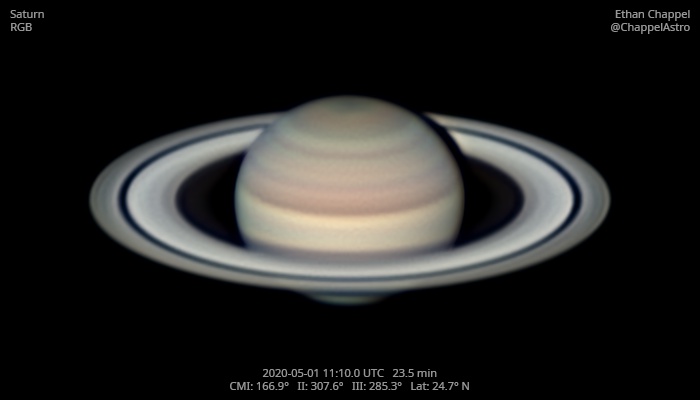
UTC
A new month has brought improved seeing conditions. The air was very humid, requiring strong dew control to keep the C14 dew-free.
Notes:
- There is a small bright smudge on the edge of the North Polar Hexagon.
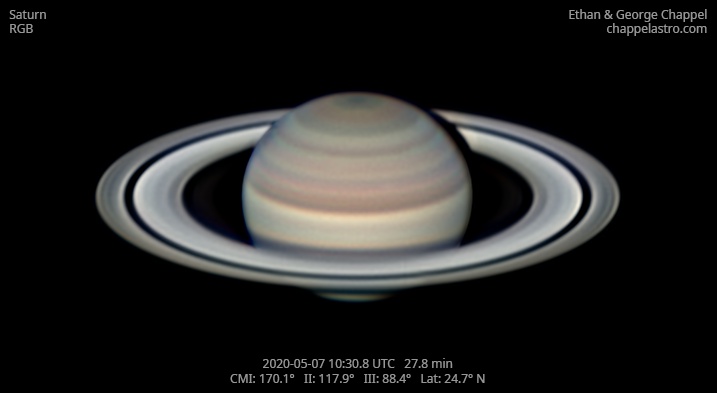
UTC
Very good seeing this morning, perhaps the best I've seen so far with Saturn in the past six years.
Notes:
- A faint smudge appears north of the North Tropical Zone.
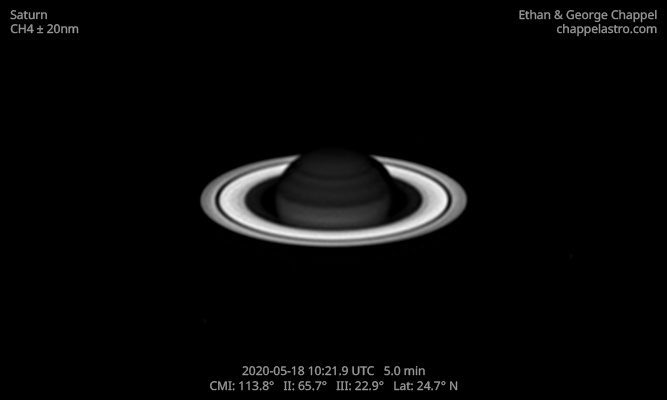
UTC
Quite good seeing this morning after over a week away due to final exams and bad weather.
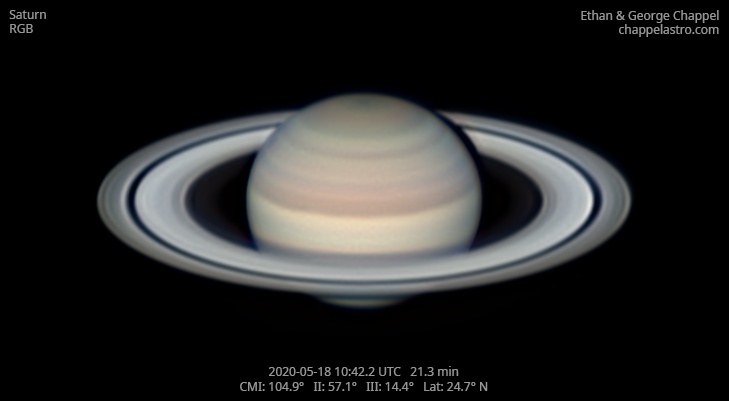
UTC
Quite good seeing this morning after over a week away due to final exams and bad weather.
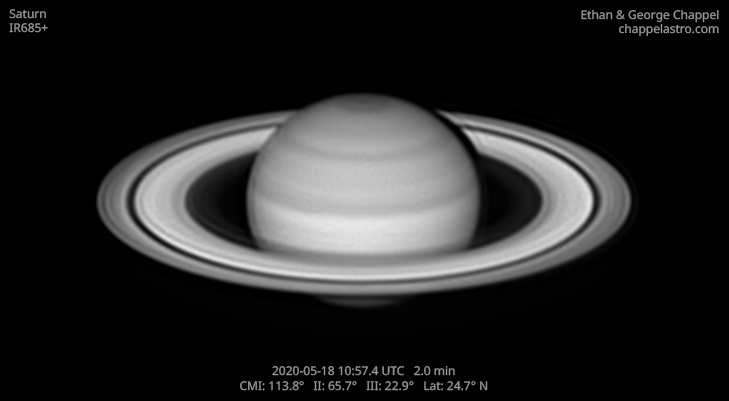
UTC
Quite good seeing this morning after over a week away due to final exams and bad weather.
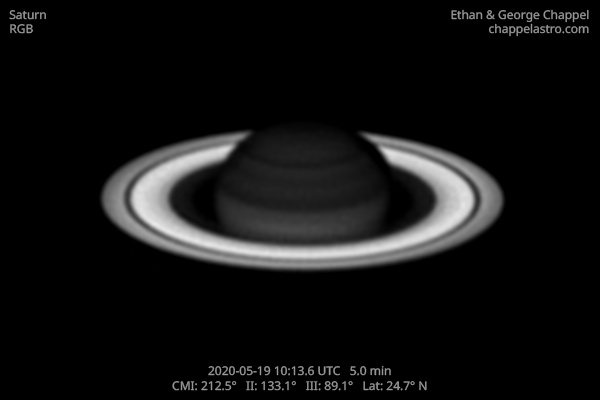
UTC
Good seeing and transparency this morning.
I started with the methane band filter while transferring Jupiter data off the laptop since the filter wheel was already set to it.
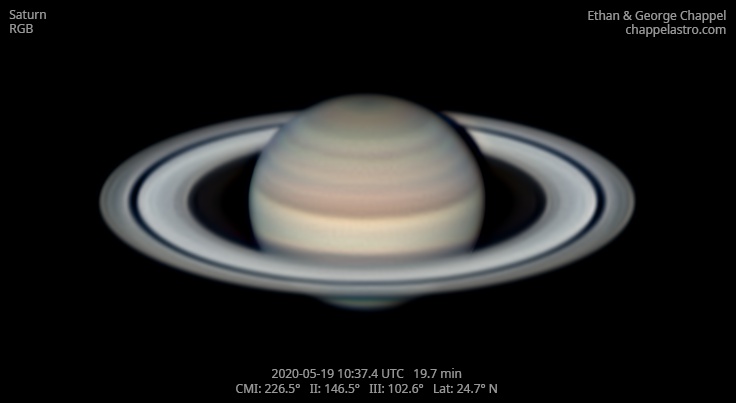

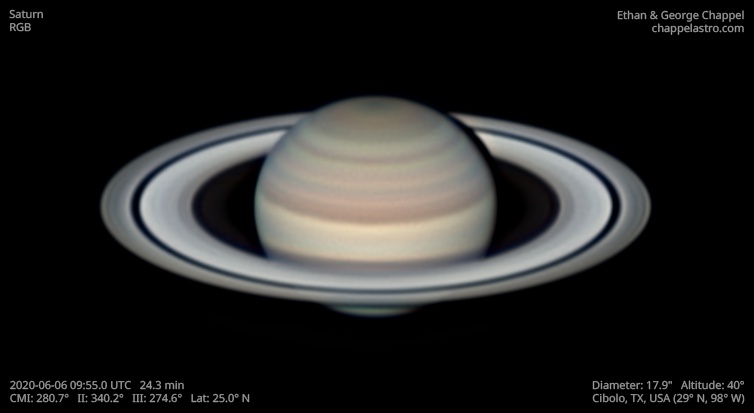
UTC
Impressive seeing and good transparency. This was the first night with my new laptop, a Dell Precision 7540. The storage in my late-2013 MacBook Pro was becoming too restrictive for planetary imaging with the C14. Previously, I would disconnect the USB hub with the accessories and delay imaging Saturn for 15 to 20 minutes to transfer Jupiter recordings to an external drive. One of my strategies to alleviate the delay was to set the filter wheel to the methane band filter and disconnect everything afterwards, but having much more storage makes this process a thing of the past. Having 3 slots for SSDs and 4 for RAM gives me plenty of room to upgrade if needed.
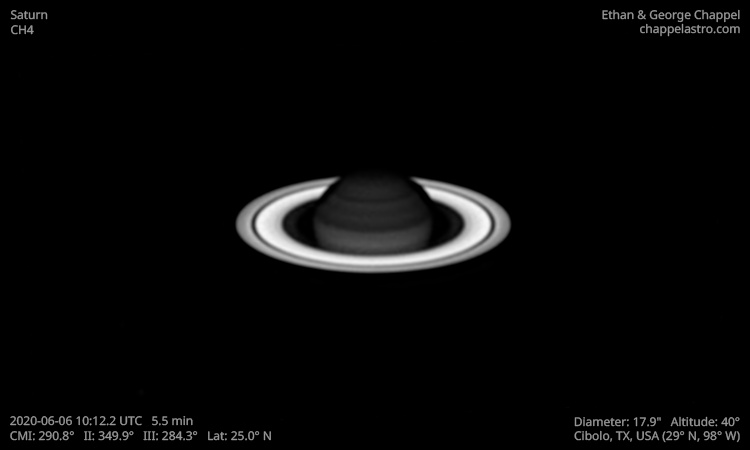
UTC
Impressive seeing and good transparency. This was the first night with my new laptop, a Dell Precision 7540. The storage in my late-2013 MacBook Pro was becoming too restrictive for planetary imaging with the C14. Previously, I would disconnect the USB hub with the accessories and delay imaging Saturn for 15 to 20 minutes to transfer Jupiter recordings to an external drive. One of my strategies to alleviate the delay was to set the filter wheel to the methane band filter and disconnect everything afterwards, but having much more storage makes this process a thing of the past. Having 3 slots for SSDs and 4 for RAM gives me plenty of room to upgrade if needed.
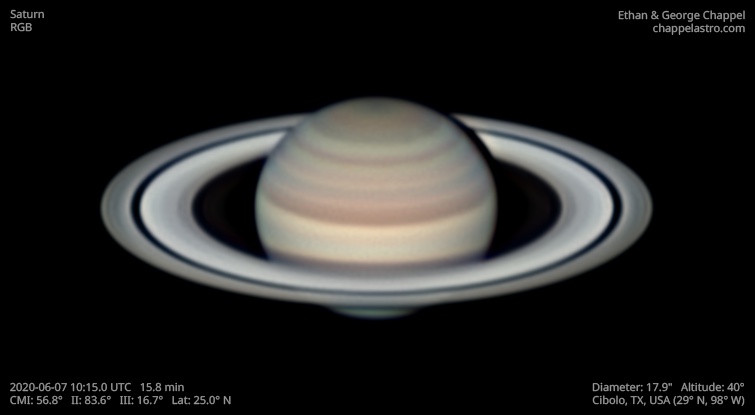
UTC
Very good seeing and transparency for the second night in a row.
Notes:
- A disturbance in the far northern regions is setting.
- A bright spot is just past the central meridian at mid-northern latitudes.
- The EZ has a gray band on the equator.
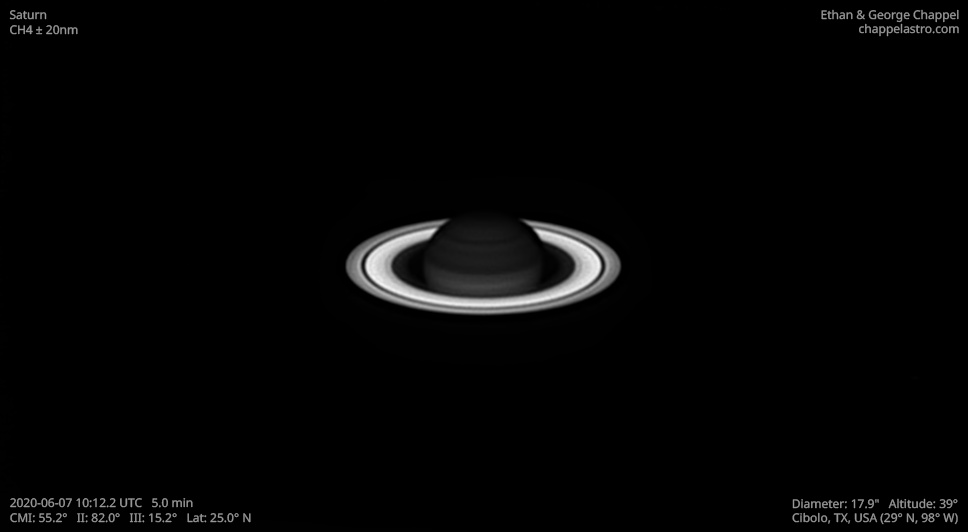
UTC
Very good seeing and transparency for the second night in a row.
Notes:
- The EZ has a bright band on the equator.
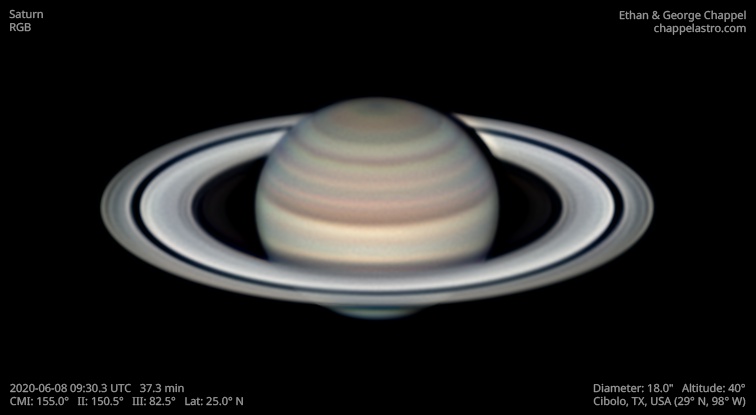
UTC
Variable conditions this morning. I spent extra time recording to have enough good data.
Notes:
- There are two small spots on the North Temperate Belt just past the central meridian.
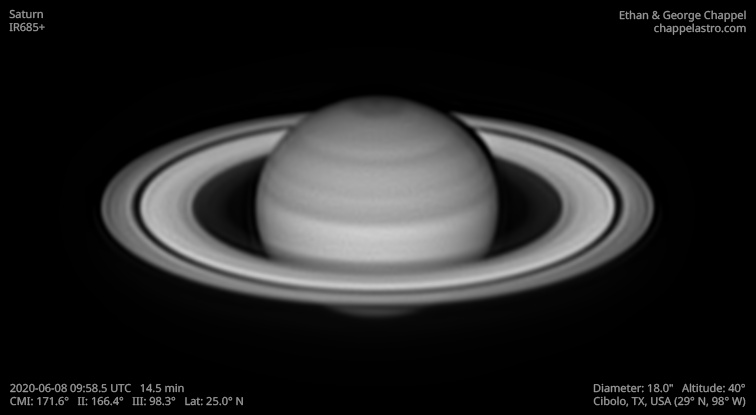
UTC
Variable conditions this morning. I spent extra time recording to have enough good data.
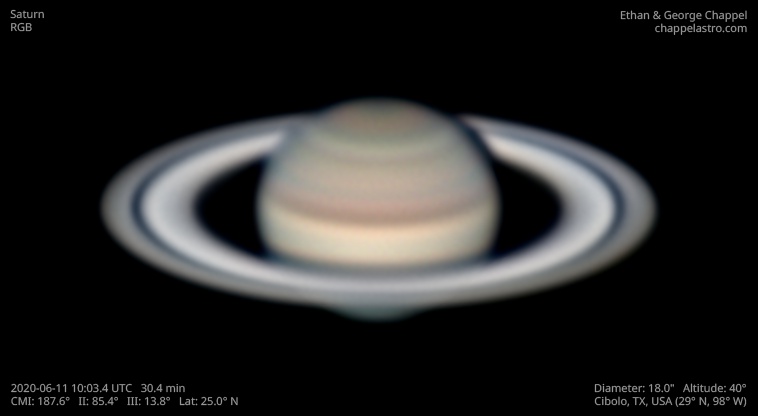
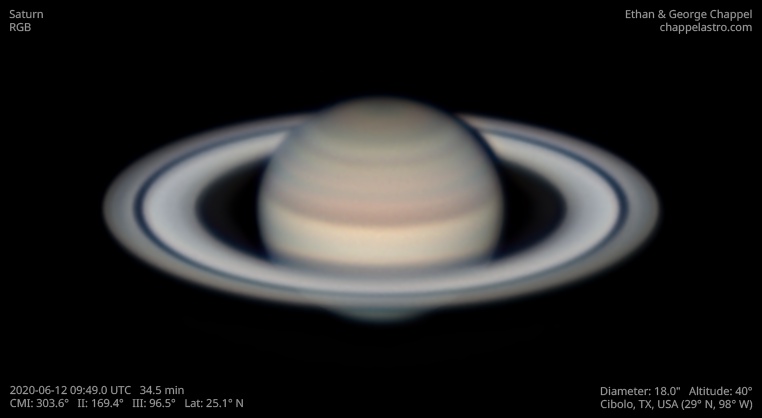
UTC
Seeing improved a bit after finishing with Jupiter. I continued to focus manually due to a malfunction with the motorized focuser.
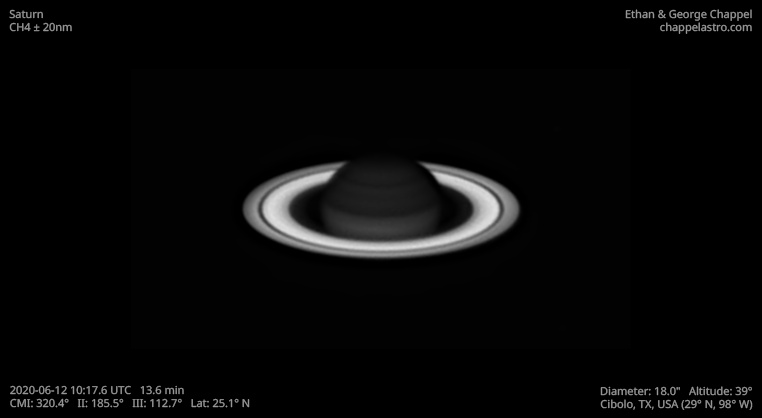
UTC
Seeing improved a bit after finishing with Jupiter. I continued to focus manually due to a malfunction with the motorized focuser.
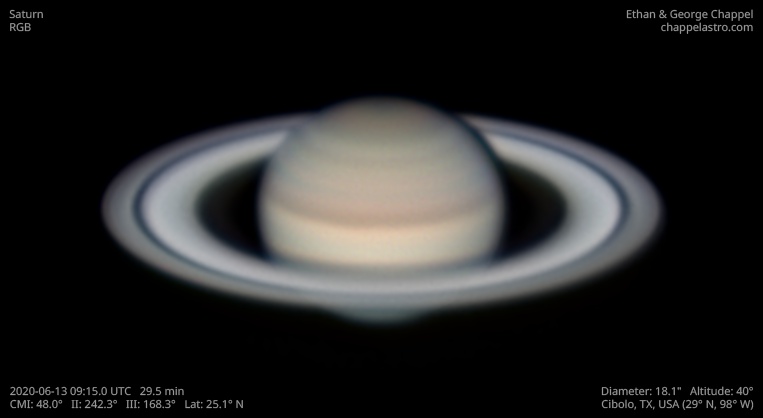
UTC
Excellent transparency and below average seeing conditions this morning, which made manually focusing difficult.
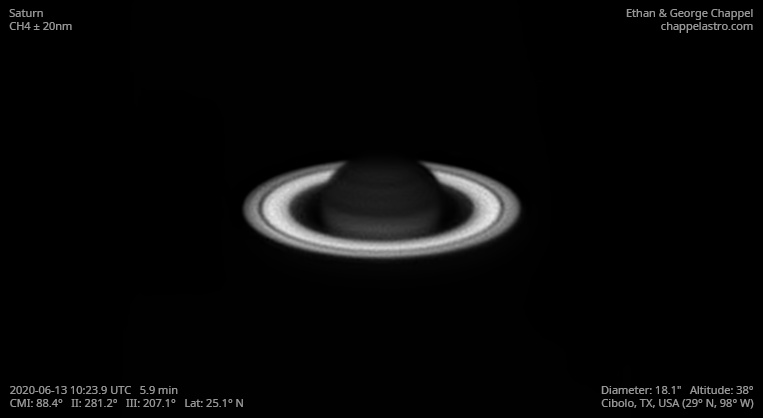
UTC
Excellent transparency and below average seeing conditions this morning, which made manually focusing difficult.
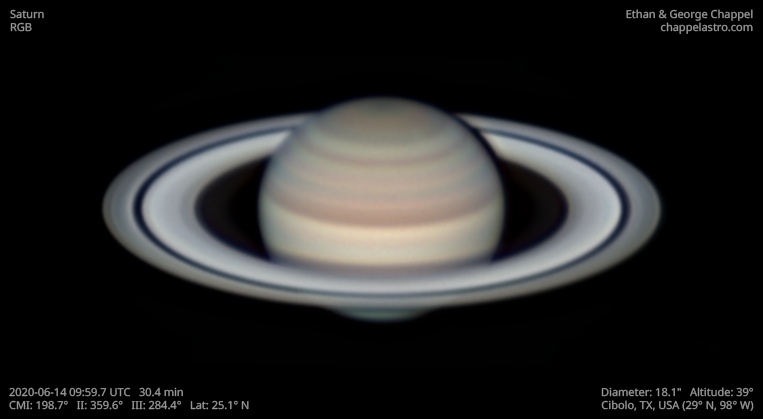
UTC
Marginally good seeing and good transparency this morning.
Notes:
- A bright storm is visible in the North Polar Region.
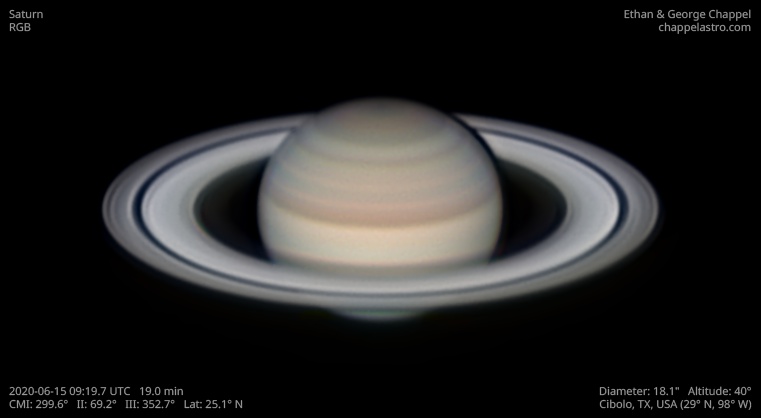
UTC
Pretty good seeing this morning after a few days of underwhelming conditions.
Notes:
- The North Polar Region around the hexagon is a shade of red.
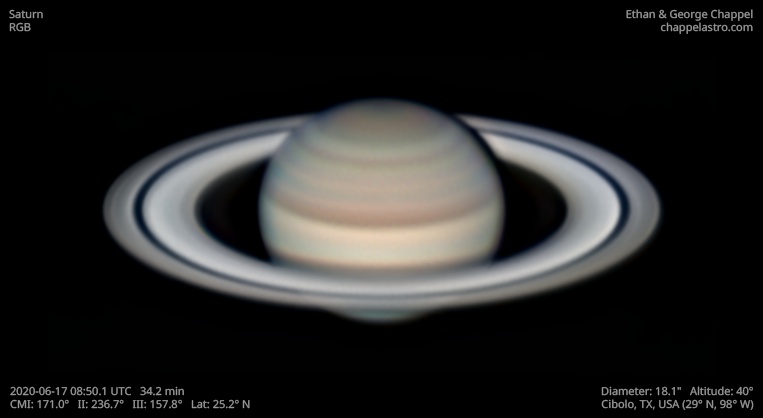
UTC
A second morning of fairly good seeing. It turns out the root of my motor focus problems was the serial cable connecting it to the controller. A new one was supposed to arrive a couple days ago, but the envelope was empty because it was improperly sealed!
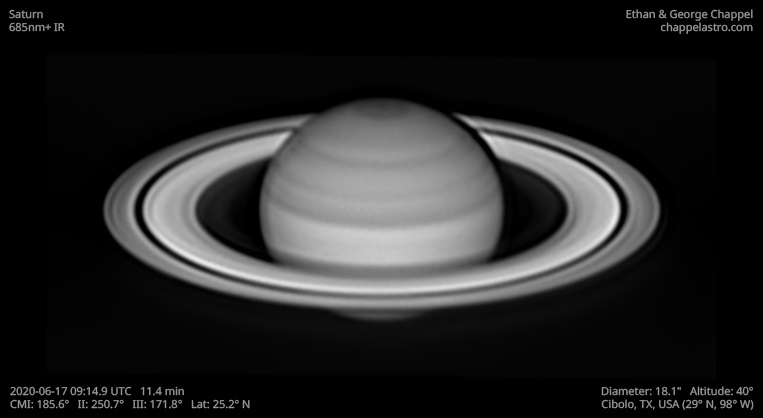
UTC
A second morning of fairly good seeing. It turns out the root of my motor focus problems was the serial cable connecting it to the controller. A new one was supposed to arrive a couple days ago, but the envelope was empty because it was improperly sealed!
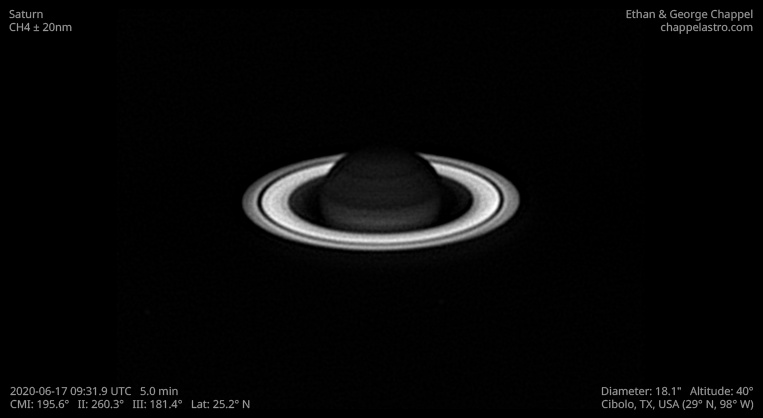
UTC
A second morning of fairly good seeing. It turns out the root of my motor focus problems was the serial cable connecting it to the controller. A new one was supposed to arrive a couple days ago, but the envelope was empty because it was improperly sealed!
Methane-band imaging was cut short by clouds and prevented Mars from being imaged.
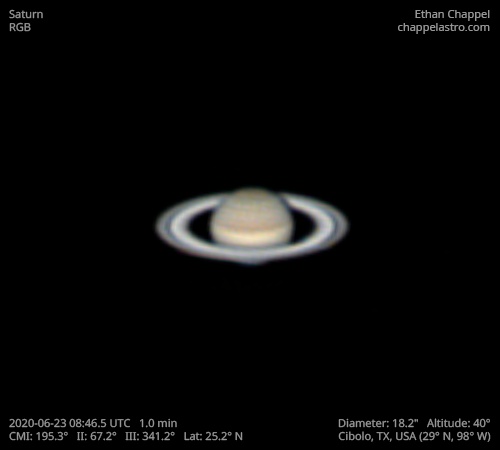
UTC
I pulled out my Sky-Watcher Classic 150P to quickly get some nice views through the eyepiece. However, I decided to see what this telescope is capable of and inserted my ASI224MC. Although thin clouds interfered with the imaging, I can't complain about the results for a setup worth a few hundred dollars.
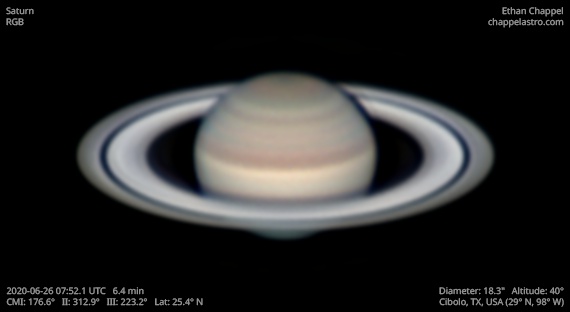
UTC
Was not expecting a clear night, so I quickly set up the C8 to take advantage of the opportunity. Clouds started to roll in as I finished with Saturn.
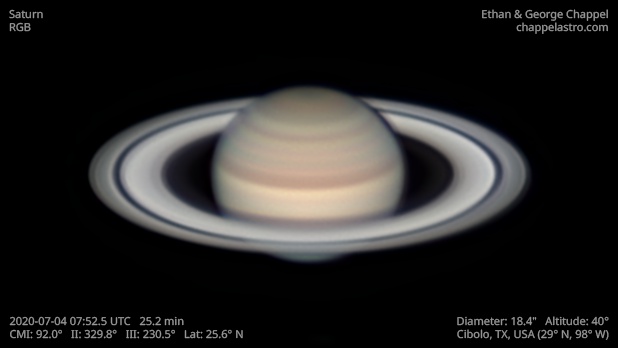
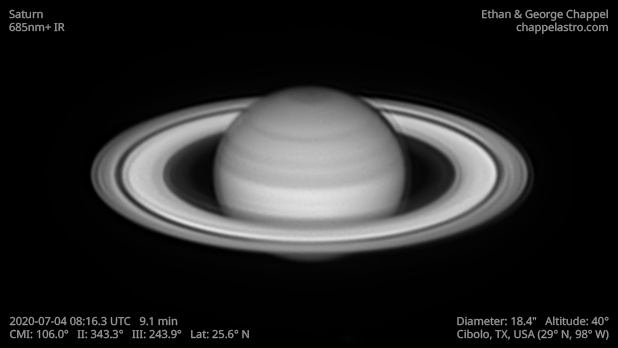
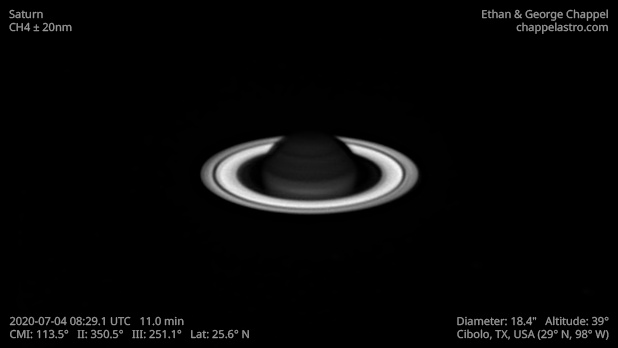
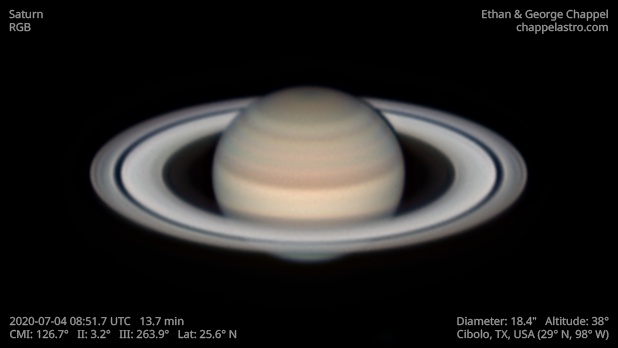
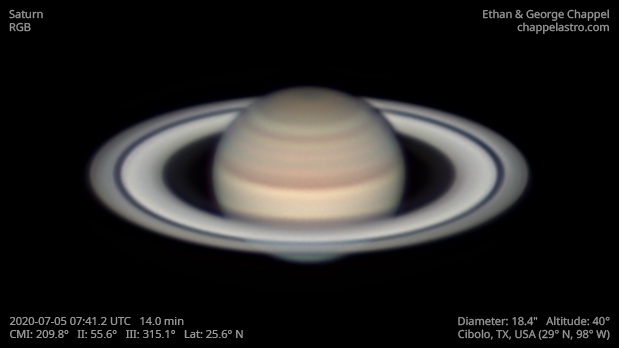
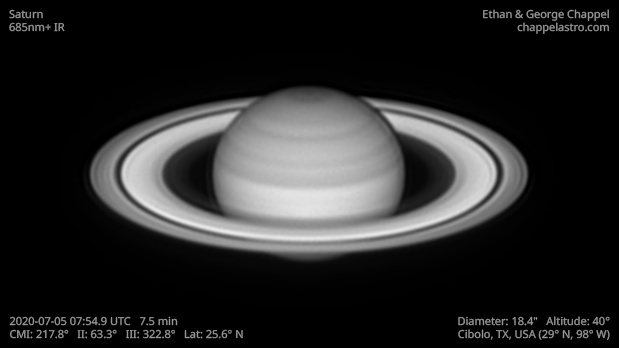
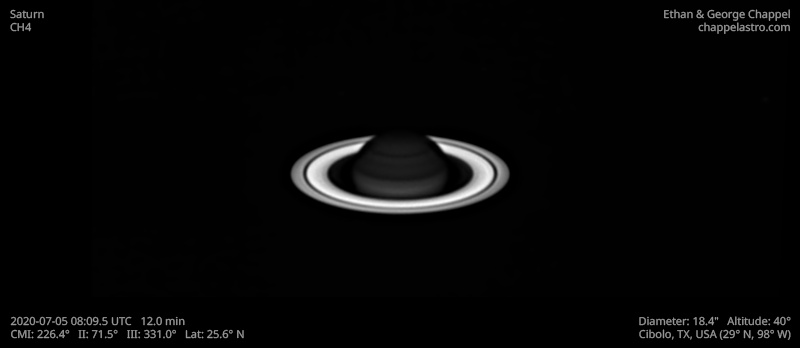
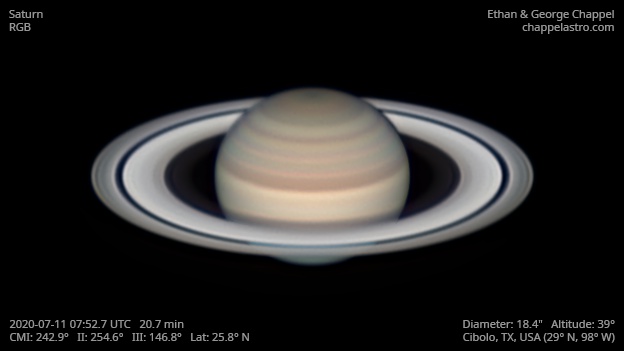
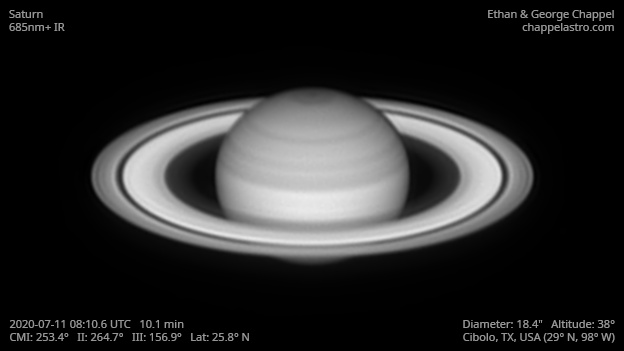
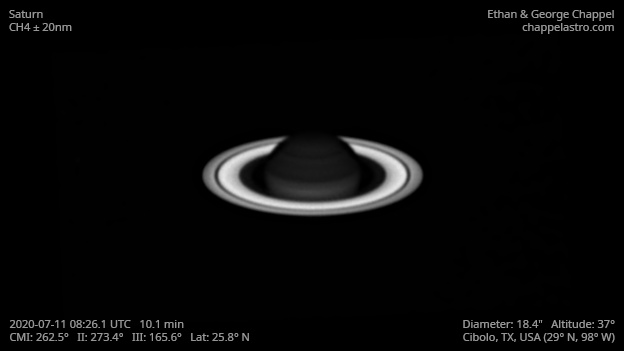
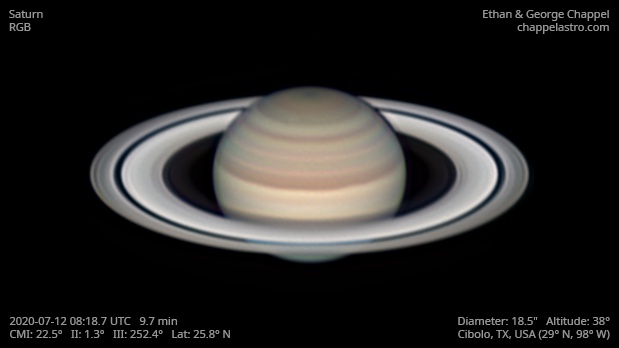
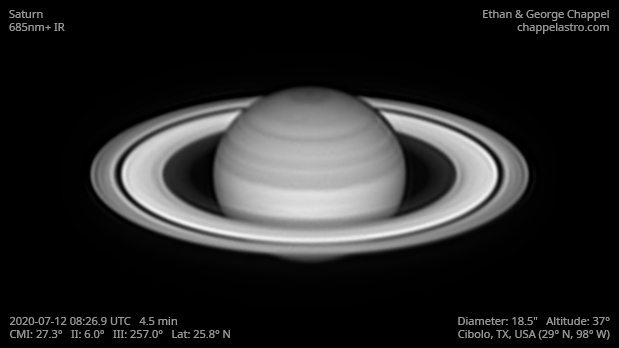
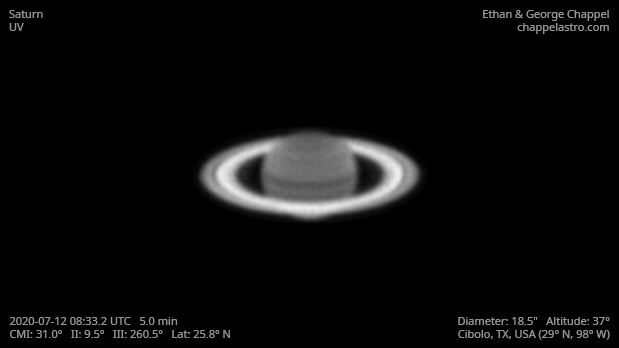
UTC
Great conditions. A small spot is visible high in the northern hemisphere.
I decided to take a look at Saturn with the new UV filter. I was surprised at how dim it was even with 2x2 binning.
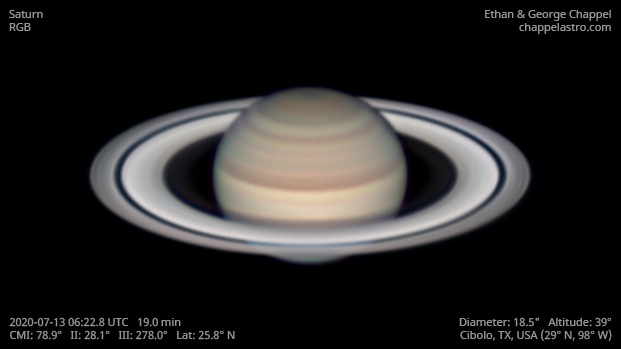
UTC
Decent conditions. A faint storm is just past the central meridian in the South South Temperate Belt.
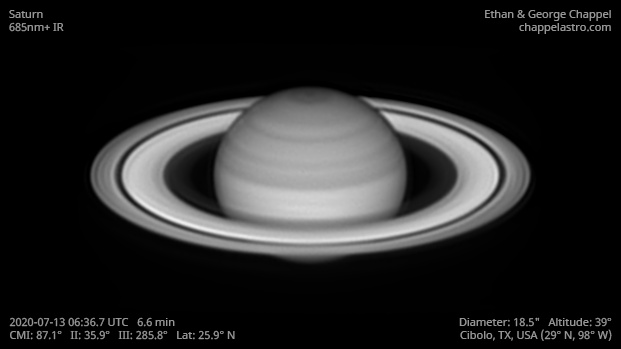
UTC
Decent conditions. A faint storm is just past the central meridian in the South South Temperate Belt.
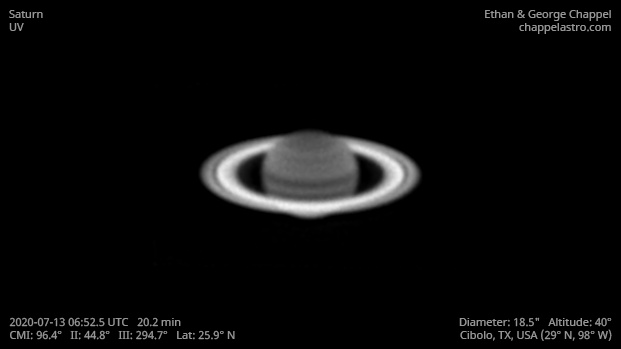
UTC
Decent conditions. A faint storm is just past the central meridian in the South South Temperate Belt.
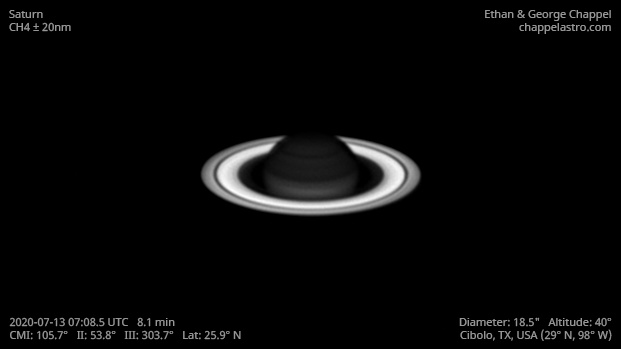
UTC
Decent conditions. A faint storm is just past the central meridian in the South South Temperate Belt.
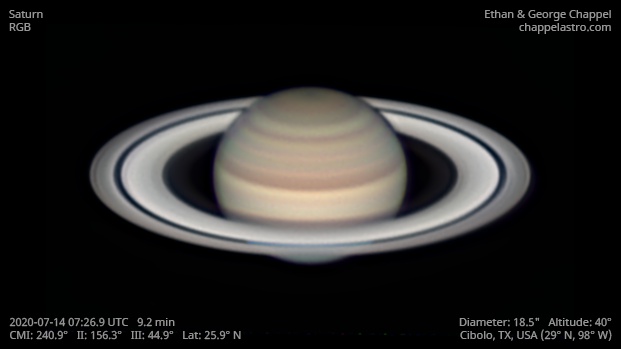
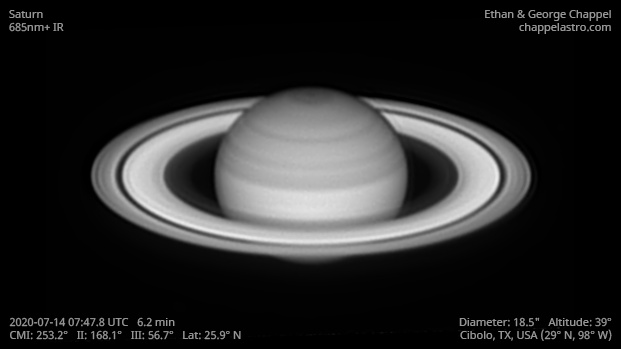
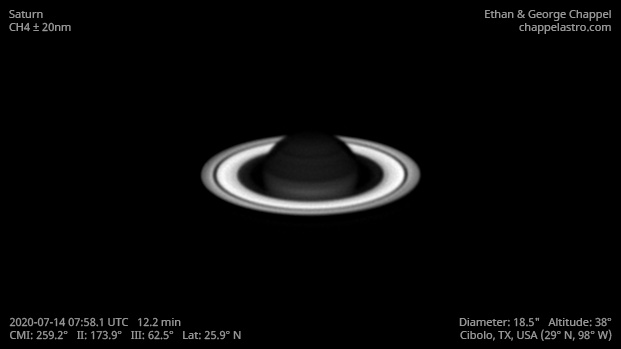
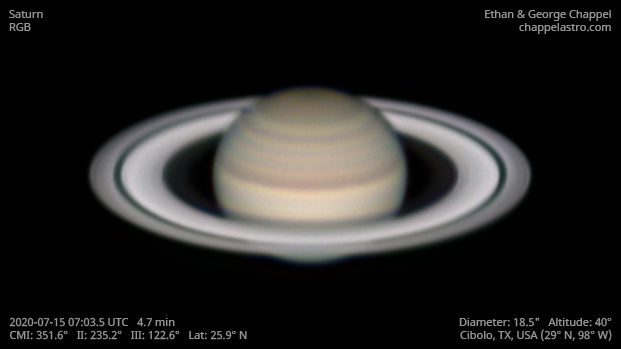
UTC
Decent seeing for this first light with my new ASI462MC. This was used without the Atmospheric Dispersion corrector since I couldn't figure out how to make it fit in the existing imaging train.
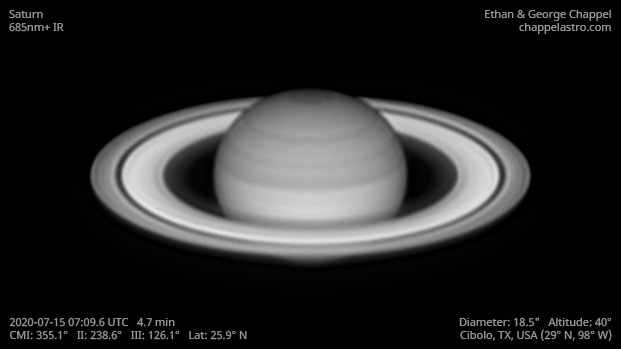
UTC
Decent seeing for this first light with my new ASI462MC. This camera is more sensitive than the ASI290MM, especially in near-infrared wavelengths.
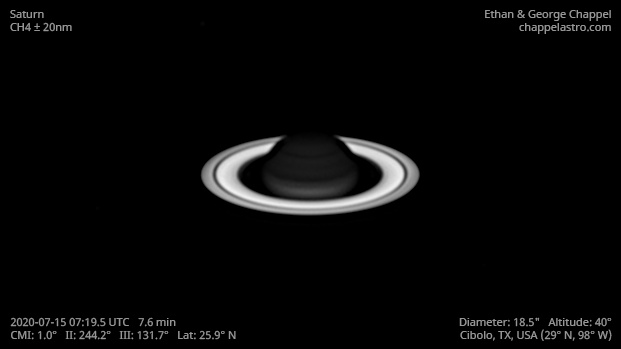
UTC
First light with my new ASI462MC. This camera is more sensitive than the ASI290MM, especially in near-infrared wavelengths.
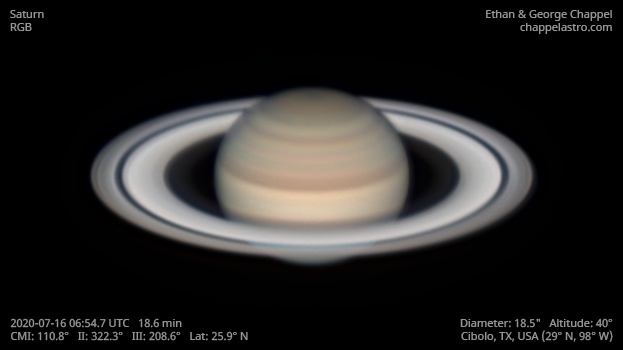
UTC
Third night of decent seeing. As Saturn moves closer to opposition, its rings will soon begin brightening from the Seeliger Effect.
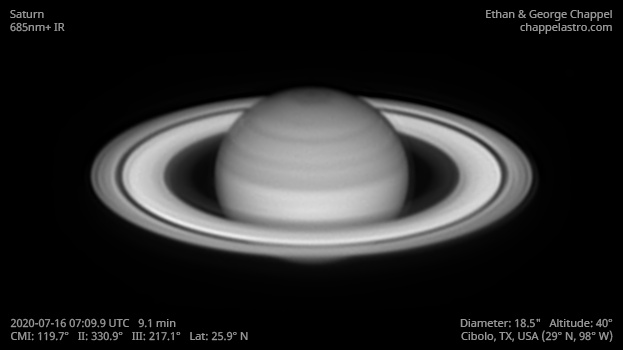
UTC
Third night of decent seeing. As Saturn moves closer to opposition, its rings will soon begin brightening from the Seeliger Effect.
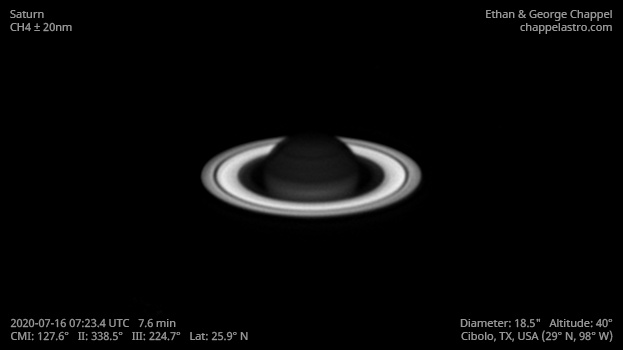
UTC
Third night of decent seeing. As Saturn moves closer to opposition, its rings will soon begin brightening from the Seeliger Effect.
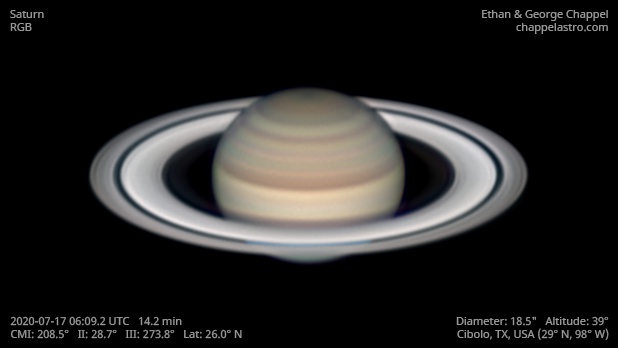
UTC
Good conditions on this night. A faint spot is setting high in the northern hemisphere.
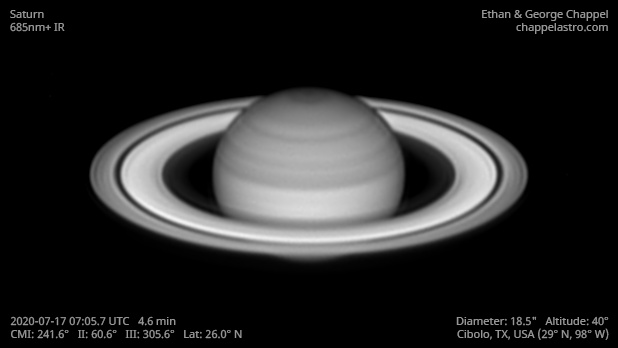
UTC
Good conditions on this night. A faint spot is setting high in the northern hemisphere.
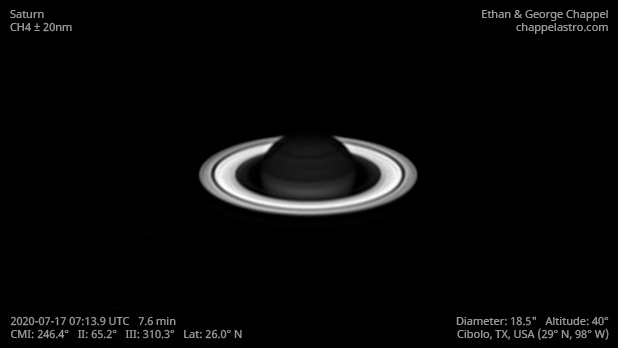
UTC
Good conditions on this night. A faint spot is setting high in the northern hemisphere.
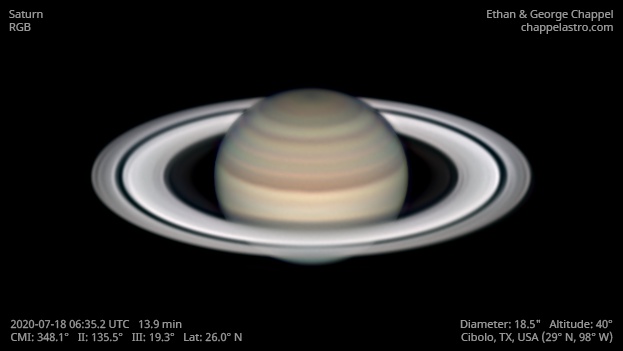
UTC
Good seeing and transparency. The rings are starting to appear brighter as Saturn nears opposition as a result of the Seeliger Effect.
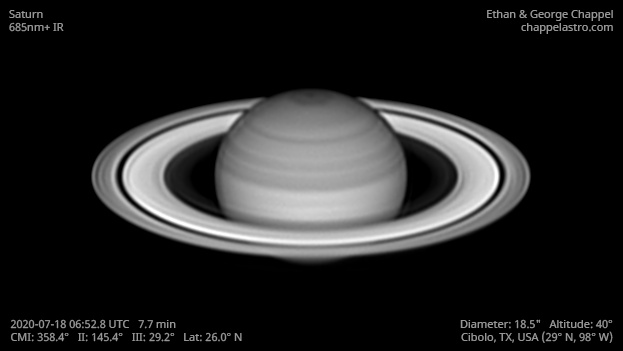
UTC
Good seeing and transparency. The rings are starting to appear brighter as Saturn nears opposition as a result of the Seeliger Effect.
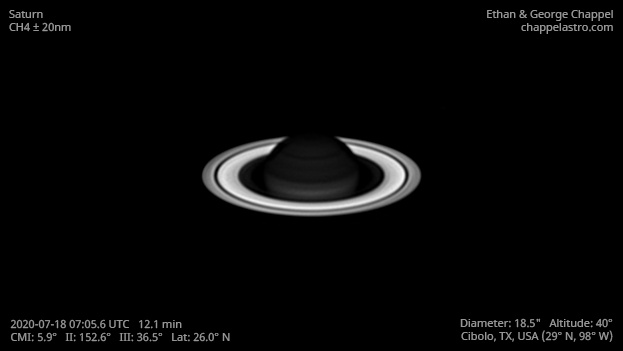
UTC
Good seeing and transparency. The rings are starting to appear brighter as Saturn nears opposition as a result of the Seeliger Effect.
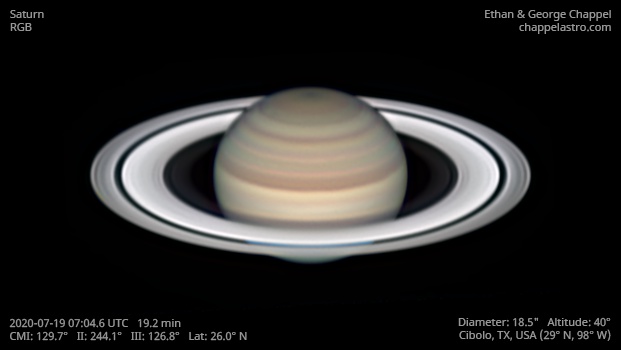
UTC
Excellent conditions. The faint spot in the North North Temperate Zone spot is rising. The rings also continue to appear brighter as opposition nears due to the Seeliger Effect.
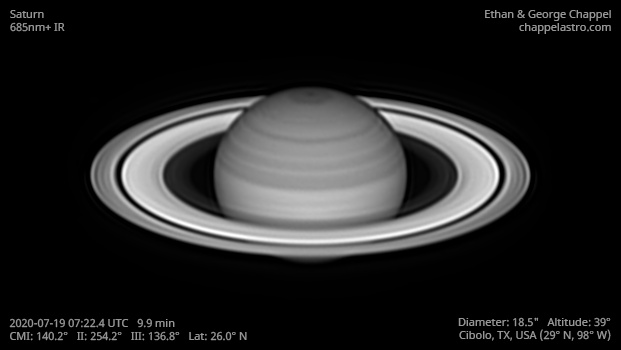
UTC
Excellent conditions. The faint spot in the North North Temperate Zone spot is rising. The rings also continue to appear brighter as opposition nears due to the Seeliger Effect.
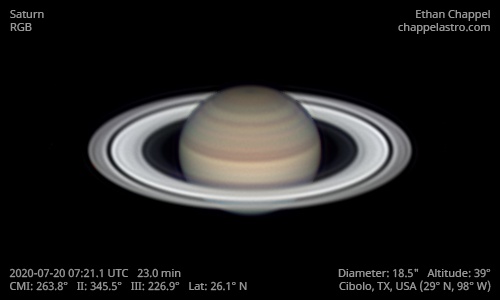

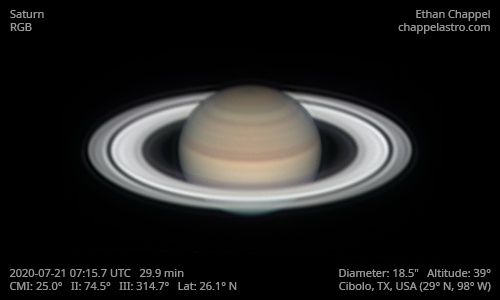
UTC
Excellent seeing on this night. The rings are still very bright from the Seeliger Effect 1 day after opposition.
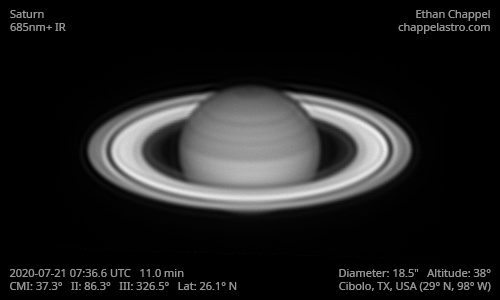
UTC
Excellent seeing on this night. The rings are still very bright from the Seeliger Effect 1 day after opposition.
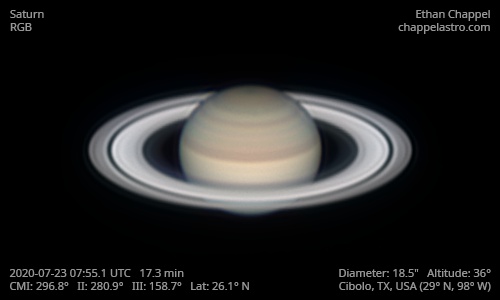
UTC
Great seeing conditions. The Seeliger Effect is fading as Saturn moves on from opposition.
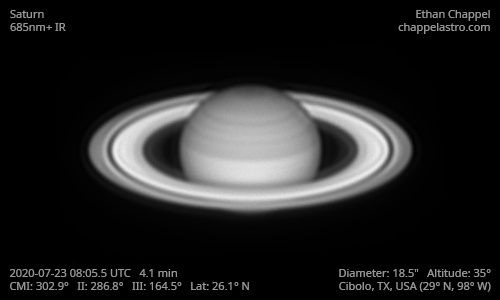
UTC
Great seeing conditions. The Seeliger Effect is fading as Saturn moves on from opposition.
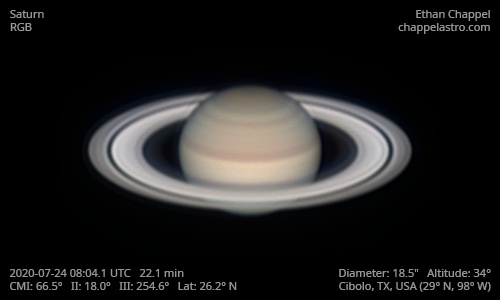
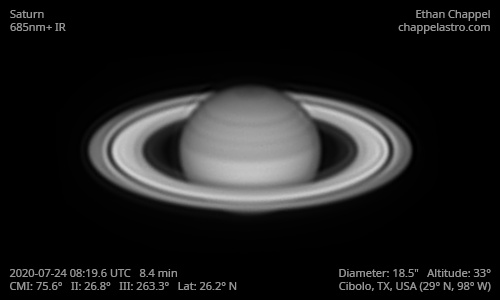
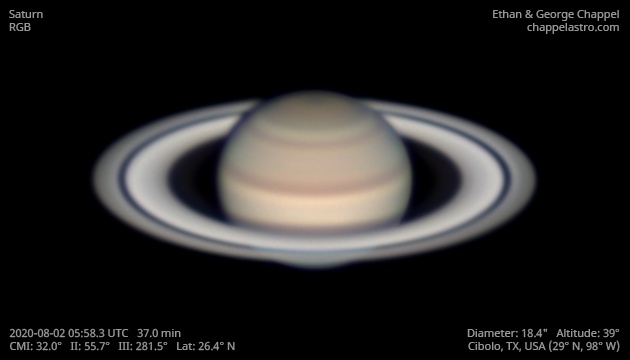
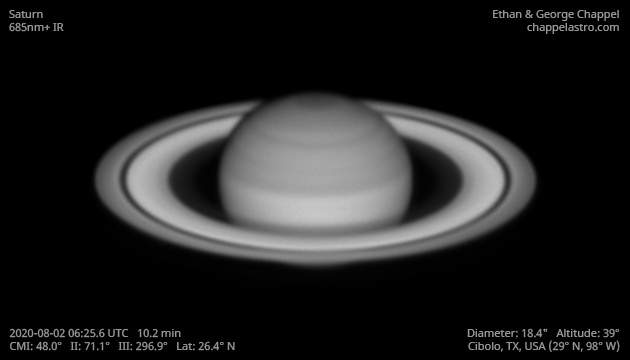
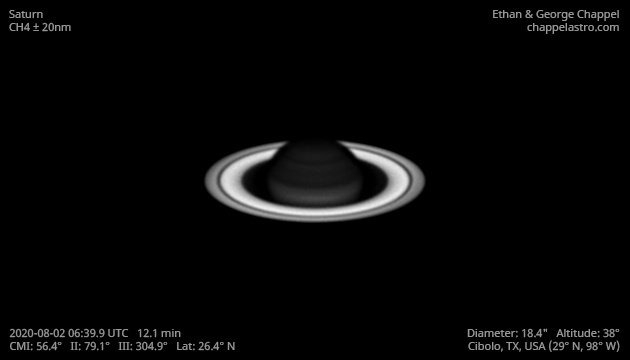
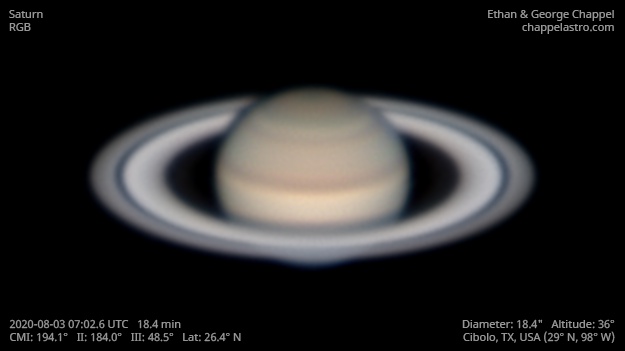
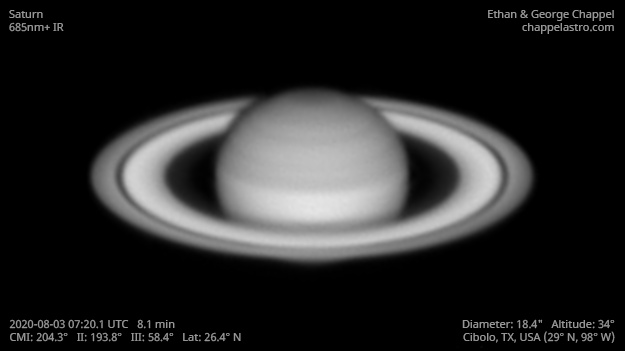
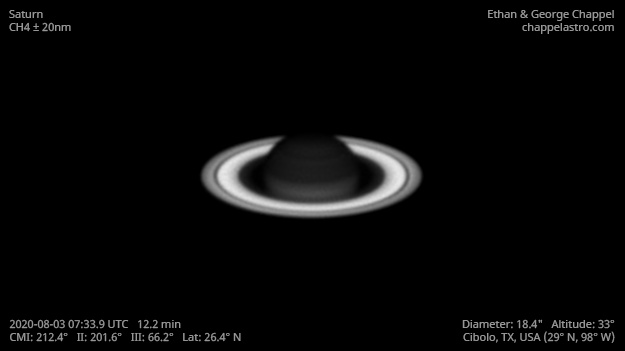
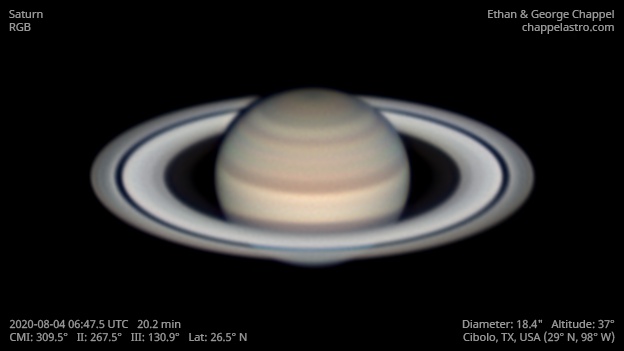
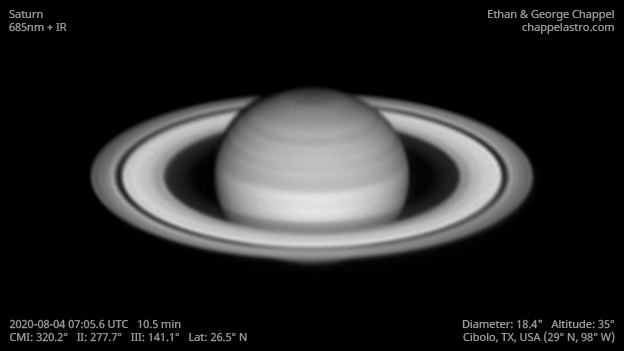
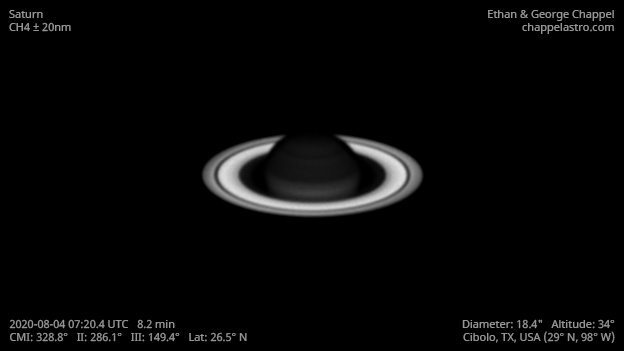
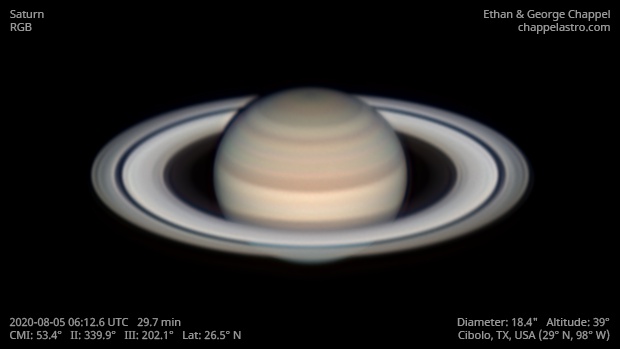
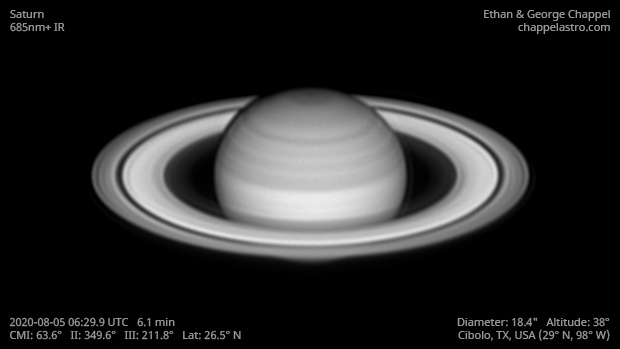
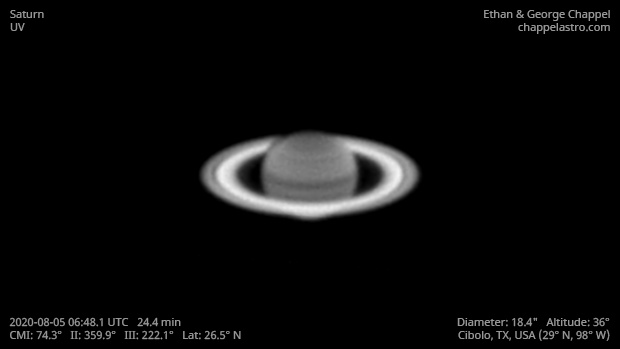
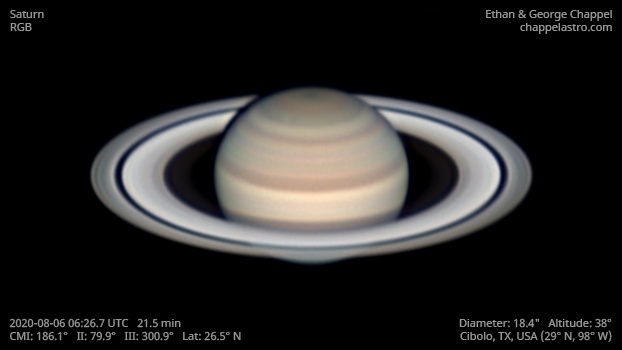
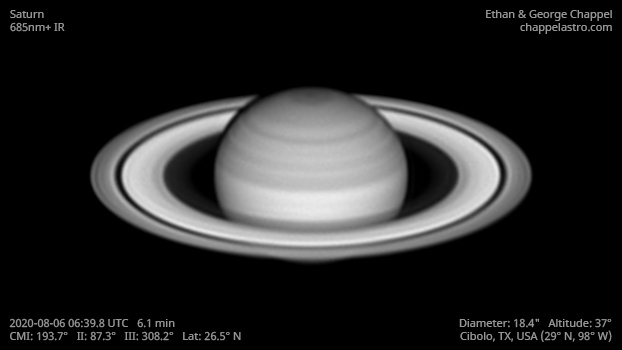
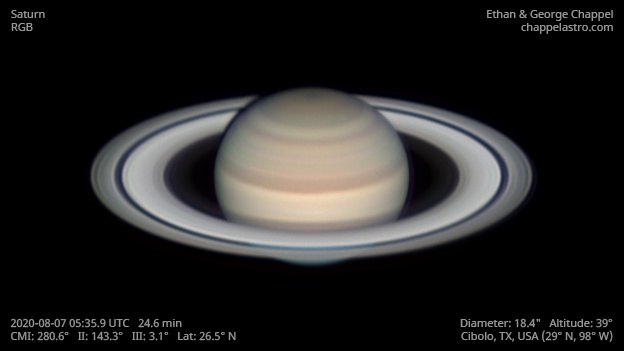
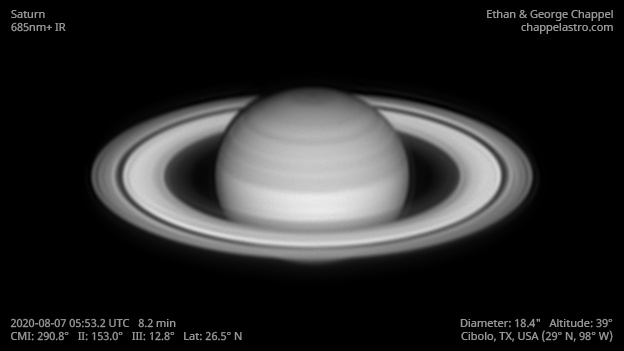
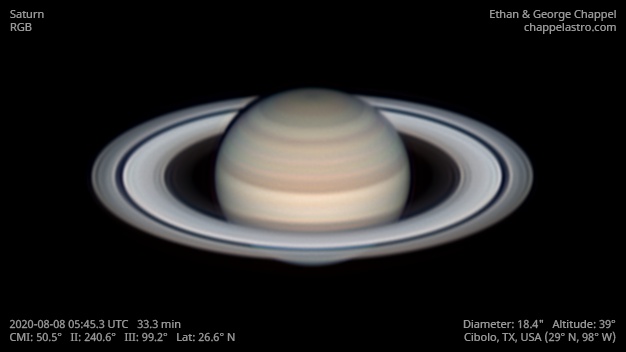
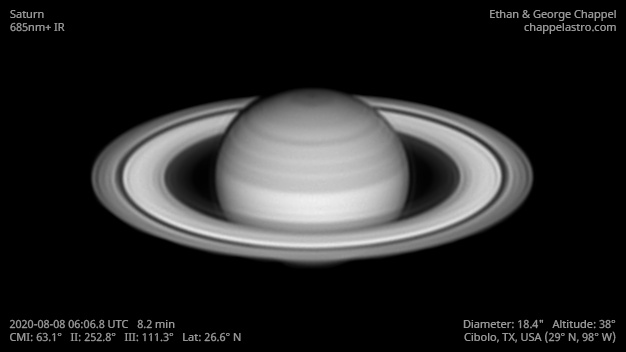
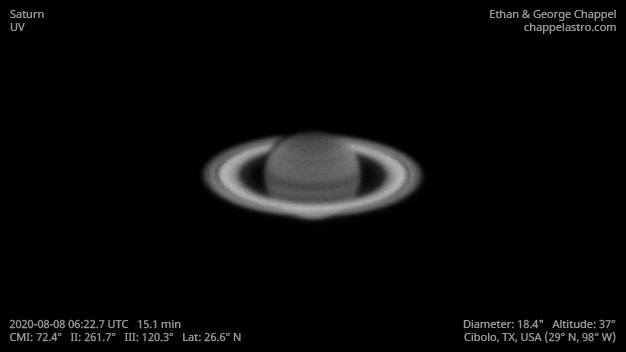
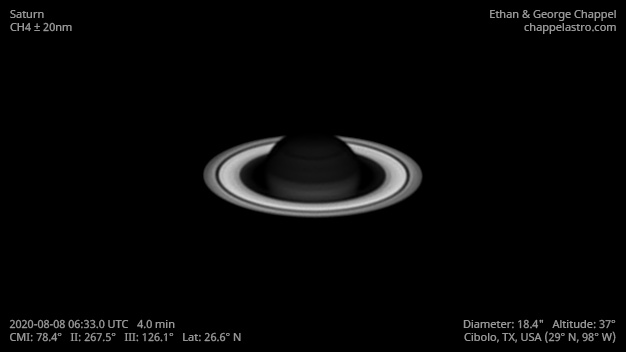
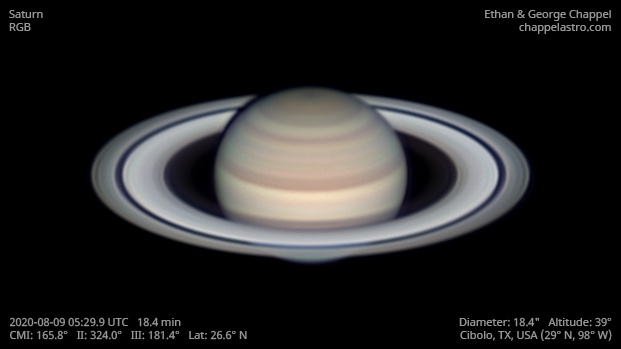
UTC
Good seeing conditions. As I was imaging, I could hear a local raceway about 10km away. No storms are visible on this side of the planet, but plenty of bands are visible across the disk.
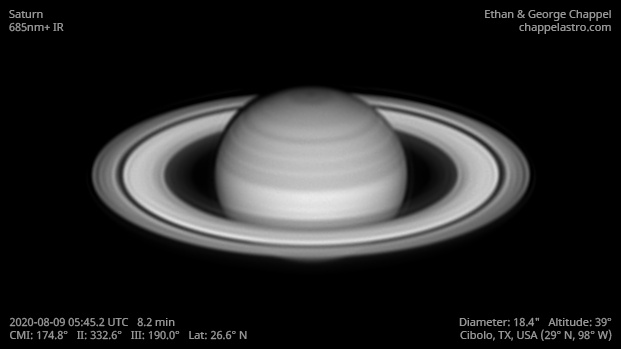
UTC
Good seeing conditions. As I was imaging, I could hear a local raceway about 10km away. No storms are visible on this side of the planet, but plenty of bands are visible across the disk.
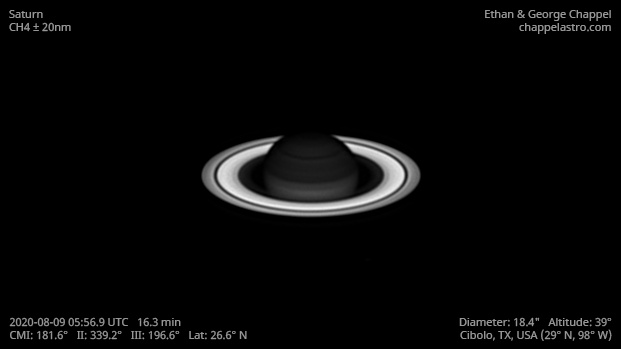
UTC
Good seeing conditions. As I was imaging, I could hear a local raceway about 10km away. No storms are visible on this side of the planet, but plenty of bands are visible across the disk.
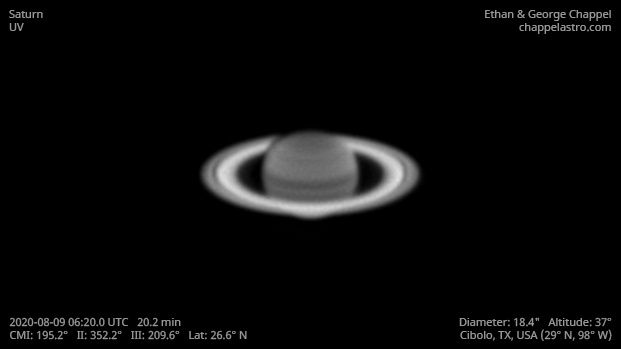
UTC
Good seeing conditions. As I was imaging, I could hear a local raceway about 10km away. No storms are visible on this side of the planet, but plenty of bands are visible across the disk.
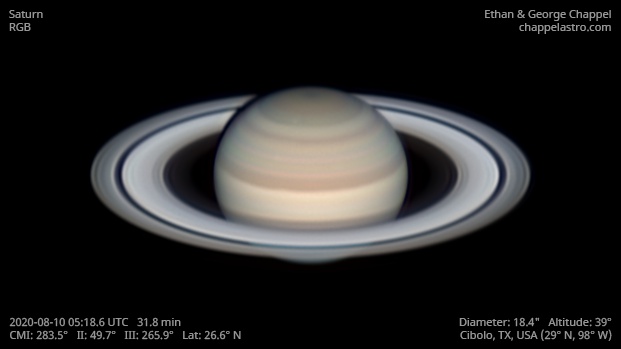
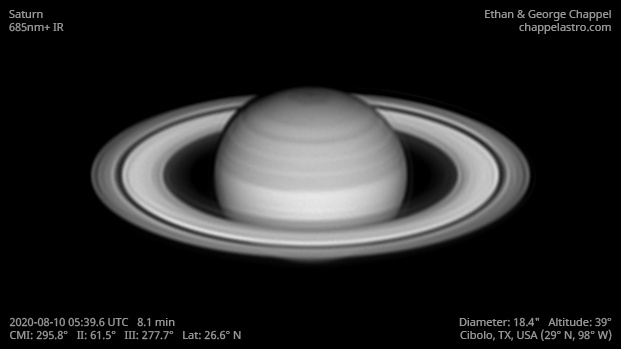
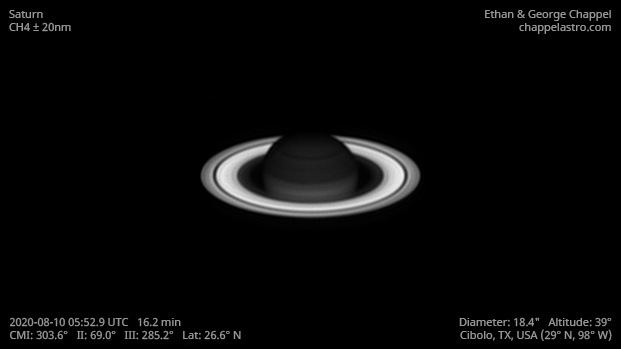
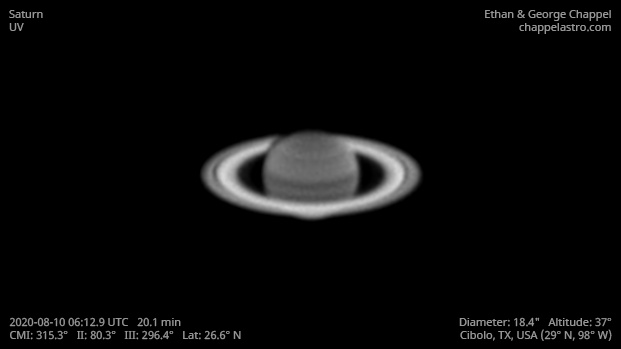
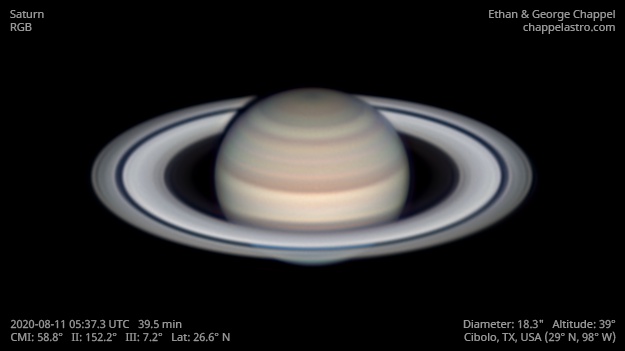
UTC
It was a breezy night, which tends to be difficult on the CGEM DX carrying the EdgeHD 14, but it was manageable and the seeing was good enough to make it worth the effort.
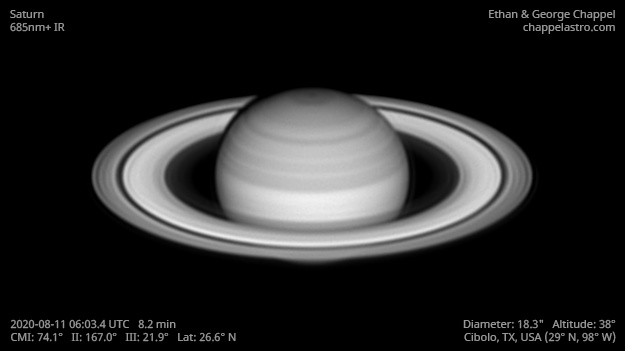
UTC
It was a breezy night, which tends to be difficult on the CGEM DX carrying the EdgeHD 14, but it was manageable and the seeing was good enough to make it worth the effort.
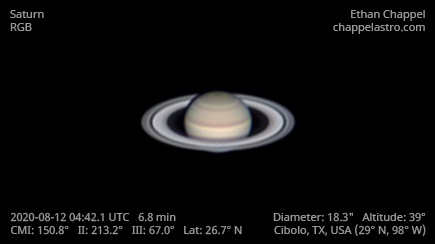
UTC
I started imaging Saturn with my Sky-Watcher Classic 150P and ASI120MC about 45 minutes before the normal EdgeHD 14 setup. Seeing was very good throughout the time time spent with both setups.
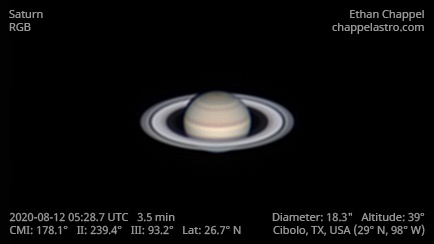
UTC
I started imaging Saturn with my Sky-Watcher Classic 150P and ASI120MC about 45 minutes before the normal EdgeHD 14 setup. Seeing was very good throughout the time time spent with both setups.
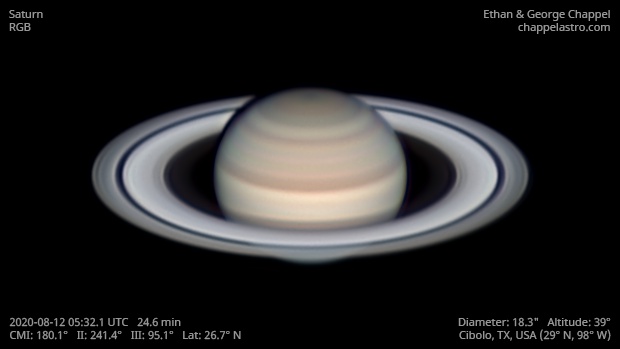
UTC
I started imaging Saturn with my Sky-Watcher Classic 150P and ASI120MC about 45 minutes before the normal EdgeHD 14 setup. Seeing was very good throughout the time time spent with both setups.
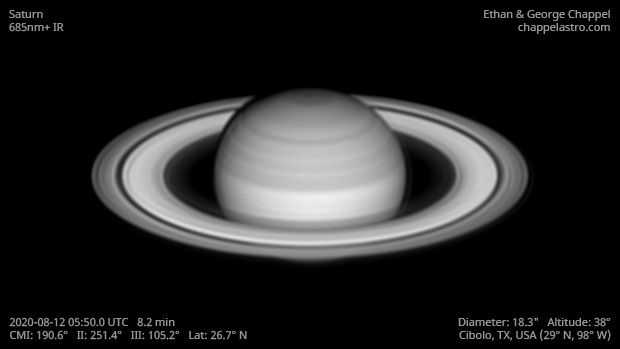
UTC
I started imaging Saturn with my Sky-Watcher Classic 150P and ASI120MC about 45 minutes before the normal EdgeHD 14 setup. Seeing was very good throughout the time time spent with both setups.
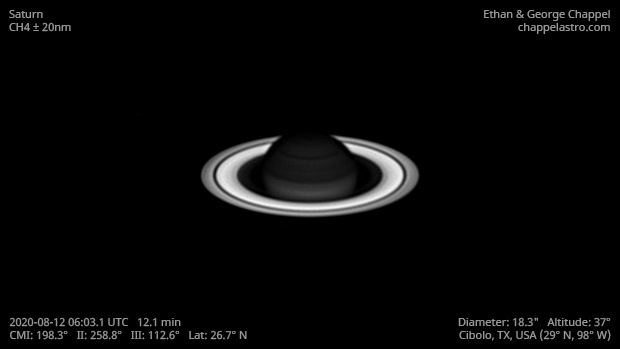
UTC
I started imaging Saturn with my Sky-Watcher Classic 150P and ASI120MC about 45 minutes before the normal EdgeHD 14 setup. Seeing was very good throughout the time time spent with both setups.
